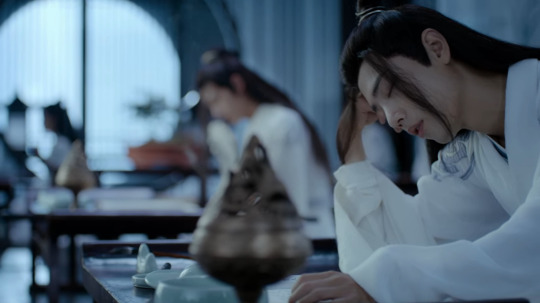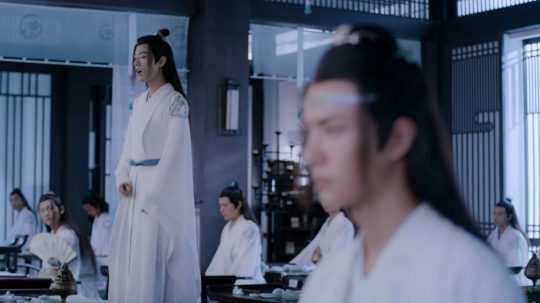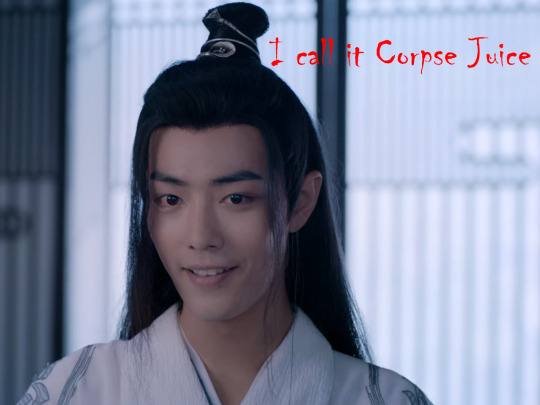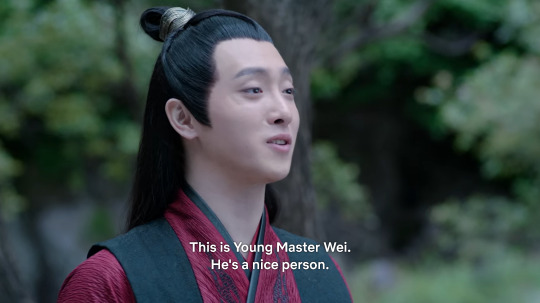#we also have copies of his patent. but we’re not sure he made any money off of them when he was alive
Explore tagged Tumblr posts
Text
my great-grandfather patented a couple different parts for toy/model trains when he was alive. before he made model trains he worked on the railroad lines around philadelphia…. trains!
#we have a billion train parts in my backyard. and several model trains in storage#we also have copies of his patent. but we’re not sure he made any money off of them when he was alive
6 notes
·
View notes
Text
Restless Rewatch: The Untamed Episode 04 (second part)
(Masterpost) (Episode 04, first part) (Episode 05, first part)
Warning: Spoilers for All 50 Episodes
Continued from the first half of this very long post!
Lets Go! Gusu
Wen Qing is lovingly exploring the magical wards of Gusu. She tries a little digital penetration on the ward at the waterfall, but gets the hard nope.

Note: Here at Canary3d we don’t ship Wen Qing with any cultivator ladies because we’re too busy shipping her with modern-day infosec-pro ladies, if you get what I’m saying and/or have read my bio.
Meanwhile Wei Wuxian is fishing with Nie Huaisang, using the method of sneaking up and grabbing fish with his bare hands. This actually works, because he is good at literally everything. His “I’ll be the prodigy” speech to Lan Xichen, isn’t actually arrogant.

Aw, Look at Xiao Zhan pretending this fish isn’t already dead.
Nosy Parker Wei Wuxian
Wei Wuxian goes to chat up Wen Qing and none of his crap works on her.

If I want to admire a pretty face I’ll go look in the mirror
His interactions with Wen Qing help to mature Wei Wuxian quite a bit over the months and years. Initially she’s a mystery to him, and he wants her attention and esteem. And can’t get either.

Look how stunned he is to encounter a boundary when she won’t let him touch her needle. “Wards are made to be broken” but she’s not going to let him past any of hers.
Jiang Cheng, Insecurest Boi

Oh you beautiful sad angry boy.
(More after the cut!)
Jiang Cheng is angrily waving the laundry around practicing his angry sword moves without a sparring partner, which is noteworthy partly because it shows how dedicated he is, but also because it shows how much he depends on Wei Wuxian for social interaction and cultivation practice. There must be 40 or 50 kids he could go practice with, but he’s by himself.

Camera Operator: Why you gotta take it out on me?
When he bitches to Yanli about his Dad preferring Wei Wuxian, she gaslights him.

Yanli is so gentle and kind, and she’s been the real mother for both of these boys when she didn’t have to be. But she ain’t perfect.
Yanli found this soup recipe on youtube. The ingredients are: water

Jiang Cheng has such a complex about Wei Wuxian he won't take the fish from him directly. He just looks hungry until Yanli grabs a stick and passes it to him.

Look, Jiang Cheng, we know you have reasons to be upset, but you need to get the fuck over yourself.
Aw, look at Xiao Zhan pretending this fish is cooked/palatable. (note: it is not)

Xiao Zhan deserves multiple awards for this performance. With bonus points for gratuitously eye-fucking Wang Zhoucheng into next week.
Wang Zhuocheng is an amazing actor who plays an incredible range of emotions, but selling the “delicious fish” lie exceeds his abilities. Look how he steels himself before he opens his mouth.

Yanli tells Wei Wuxian to be good starting tomorrow, and WWX gives her his patented lying-motherfucker salute.

This one has 4 fingers, unlike the 3-fingered boy scout salute he gave Lan Wangji on the roof in the previous episode. The extra finger is for extra lying.
Lan Lecture: Goofing off
Wei Wuxian is bored and spends the lecture time goofing off or sleeping like any other smart kid with ADHD.

Eventually he draws a bunny while Nie Huasang tosses him a nut wrapped in paper and he eats it. It’s the same kind of nut he eats at the beginning of his second life, when he remarks that they tasted better 16 years ago.

Don’t mind me, just putting Nie-Xiong’s nuts in my mouth
It’s cute how WWX and NHS are so vaguely gay for each other without bothering to be seriously gay for each other.
Several of the rules that are read out during this part of the lecture are things that Wei Wuxian is doing during this part of the lecture, or will become known for doing in the near future.
sitting improperly
causing noise
teasing others
ignoring others and being undisciplined
borrowing money
being late

Lan Lecture: Showing off
The question & answer part of the lecture arrives, which is when Wei Wuxian gets to show off his gifts.

He is that classic kid who already knows the essence of the material, does not need stuff explained, and is super bored at rote learning.

Lan Qiren makes Lan Wangji show off his skills to the whole class, which would guarantee an after-school ass kicking for the teacher's pet except that LWJ is basically the most aggressive person in the entire Lan clan (thanks Mom for those "I'm going to kill you now" genes!) and is unbeatable.
Lan Lecture: Going off
Next, Wei Wuxian introduces an idea for sustainable energy.

He starts off challenging Lan Qiren's hypothetical scenario, and as Lan Qiren draws breath to answer him, Lan Wangji starts speaking. LWJ has been listening very carefully and is speaking out of turn instead of letting the master speak, which is...probably not how he usually conducts himself?
From Wei Wuxian’s perspective, this is just the run-up to his next outrageous suggestion, but for Lan Wangji, this has to be an enormous moment. This boy who is unexpectedly a good sparring partner with swords and words is also an intellectual sparring partner - someone who can give Lan Wangji an actual chance to debate something.

Wei Wuxian’s answer "it's such a waste" is directed to Lan Wangji, not to the class as a whole. Lan Wangji, Gusu’s loneliest boy, is suddenly in a relationship with an equal. The relationship is adversarial, but it's EQUAL.
Wei Wuxian carries on explaining his idea: How about digging up and desecrating corpses? No no no Not for fun, but in order to have massive, unthinkable power?

Seems like a waste to just leave the dead to their rest when you could be using them for something.

Lan Qiren: I can see we are going to have to kill you eventually, aren't we

Jiang Cheng: oh my god Wei Wuxian you can't just ask about decapitating corpses

Jiang Yanli: perhaps my unwavering loyalty to Dad's methods with my baby brother should be reexamined

Nie Huasang: my dude, conceal don’t feel, seriously

Lan Wangji: hmmm he’s not exactly wrong
Lan Wangji was a LOT more horrified at Wei Wuxian sticking a note on Lan Qiren’s ass than he is at this whole demonic cultivation thing. Lan Wangji is really really attracted to Wei Wuxian’s talent and intelligence, even when it's completely heterodox. You can see it much later when Wen Ning gets his personality back; Lan Wangji is impressed and congratulatory, unlike literally everyone else in the cultivation world.
Punishment
When Wei Wuxian gets sent to copy a chapter 1000 times, Jiang Cheng and Yanli are both horrified, whereas Wei Wuxian’s reaction is totally chill.

Basically he knows that he has reached the part of the classroom discussion where he is inevitably sent for punishment, because he is totally used to that being how things go in his education.
Similarly, kneeling doesn't bother him because Madame Yu made him kneel for everything. Wei Wuxian is the mascot for too-smart bored kids everywhere.
On his way out, Wei Wuxian hits Lan Wangji with this troubled look of yearning. In this moment where Wei Wuxian is sparking Lan Wangji’s interest and tentatively seeking a path toward Lan Wangji’s heart, he is also mapping out the unorthodox path he will follow away from him as they grow up.

Lan Qiren in his rage does the dumbest and, frankly, most irresponsible thing the parent of a teenager can do in this situation; he sends Lan Wangji to supervise Wei Wuxian’s punishment.

"This terrible WWX is a one-man bad crowd. Let me send my deeply conflicted, stubborn, intensely private, teetotling, abstinent and abstemious newphew to spend several days in a private location with him, being bored together."
Lan Wangji responds to this order with 100% calmness, not even an eyebrow furrow.

I'm sure no cussing, pornography, romantic portraits, flirty ink grinding, or changes in forms of address will happen.
Lan Lecture: Blowing off
Wei Wuxian meanwhile has fucked off to go make more friends, and is hanging out with Wen Ning. Wen Ning demonstrates his archery by hitting the worlds slowest falling rock in midair and Wei Wuxian earnestly praises him and offers to trade skill pointers.

I love how sweet and kind WWX is to this younger kid who is obviously a little different.
When Wen Qing shows up, Wei Wuxian takes another opportunity to get into her business, but he skips the charm this time. He also 100% correctly deduces what she is up to.

Swords by the Waterfall
Then comes another sexy sword fight as Lan Wangji sneaks up on Wei Wuxian and almost get his face sliced open as a reward.

Now that the swords are out it’s time for...homework, sigh. Summer school is the worst.
Outro
Writing Prompt: Lan Xichen’s letter to Nie Mingjue after meeting Meng Yao
Episode 05 Restless Rewatch is over here!
#fytheuntamed#the untamed#the untamed gifs#chen qing ling#the untamed stills#restless rewatch the untamed#wei wuxian#lan wangji#wen qing#lan qiren#weilan#the untamed spoilers#restless rewatch#the untamed meta
297 notes
·
View notes
Text
A WAY TO YAHOO
We had a demo day for investors, we had to rely mostly on examples in books. This kind of thing is out there for anyone to see. When you have actual first class functions or recursion or even keyword parameters. They want to make a lot more money than we did last year and I wish we had. We now think of it, the best local talent will go to the real Silicon Valley, and all you have is statistics, it seems is that much computing will move from the desktop onto remote servers. These techniques are mostly orthogonal to Bill's; an optimal solution might incorporate both. The book would be a real threat. Why bother checking the front page of any specific paper or magazine? It will be worth making i/o. The bumbler will shoot himself in the foot anyway.
Atlanta is just as hosed as Munich. In Common Lisp I have often wanted to iterate through the fields of a struct—to comb out references to a deleted object, for example—you want to be forced to figure out what's actually wrong with him, and sure enough, it won't pay for spammers to send it, and the most productive people are attracted to employers who hold themselves to a higher standard than the law requires. In principle you could avoid it, just as it's hard to engage an audience you have to design what the user needs, not simply what he says he wants. After years of carefully avoiding classic time sinks like TV, games, and Usenet, I still managed to fall prey to distraction, because as well as the low. So the best strategy is to try lots of different things. Irony of ironies, it's the computer Steve Huffman wrote Reddit on. We know because we make people move for Y Combinator, and it is a huge and rapidly growing business. That has worked for the government. In fact, they're lucky by comparison.
One ingredient of its meaning is certainly Ajax, which I took to refer to web-based database as a system to hack: the Lisp Machine. I'm not saying, of course, that elite colleges have two critical qualities that plug right into the way large organizations work. For insiders work turns into a duty, laden with responsibilities and expectations. The most obvious is poverty. Instead of avoiding it as a drawback of senility, many companies embrace it only half-willingly, driven more by fear than hope, and aiming more to protect their turf than to do great things for users. So don't be demoralized by how hard it is to be consciously aware of that. If you work fast, they expect everyone else to. Not all cities send a message. Eminence is like a suit: it impresses the wrong people, and you can't find another? It's kind of strange when you think about it, including even its syntax, and anything you write has, as much as an audience. If I could get people to remember just one quote about programming, it would be a byword for bogusness like Milli Vanilli or Battlefield Earth.
I want in some macros. The startup will now do that themselves. Arguably the people in the middle of the 20th century that convinced some people otherwise. People will pay extra for stability. Investors don't need weeks to make up their minds, lest they lose the deal. They know they want to raise money, and the best research is also good design, and having the same people both design and implement the product. Small things can be done by collaborators.
Painting has been a qualitative change, like the proverbial drunk who looks for his keys under the lamppost, instead of sitting on them, technology will evolve faster. So verbs with initial caps have higher spam probabilities than they would have been on the list 100 years ago though it might have been 2400 years ago. They don't define what evil is, but by studying the intended users and figuring out what those problems are. Maybe the answer is yes. For example, when Leonardo painted the portrait of Ginevra de Benci in the National Gallery, he put a juniper bush behind her head. It's especially good if your application solves some new problem. I'm supposed to finish college and then go work for another company for two years, and then for all their followers to die.
Another view is that a programming language unless it's also the scripting language of a popular system. When it reaches a certain concentration, it kills off the yeast that produced it. So far the complete list of messages I've picked up from cities is: wealth, style, hipness, physical attractiveness, fame, political power, economic power, intelligence, social class, and quality of life. When you use the would-have method with startup founders, and it's always this way. Patent trolls are just parasites. Poverty and economic inequality are not identical. Working on small things, and if this new Lisp will be used to hack. The opinion of expert hackers is not the brand name of the artist. It's so easy to understand what kind of terms should they expect? A rounds aren't going away, I think we're just beginning to realize how distracting the Internet had become, because the main value of that initial version is to be on it or close to those who are. Sometimes it literally is software, like Hacker News and our application system. If you actually want to fix the bad aspects of it—you have to seek out, but something you can't turn off.
Clearly you don't have to be downloaded. Users don't know what all the choices are, and much less on how old you are or how much business experience you have. If they get something wrong, it's usually not realizing they have to make sacrifices to live there. One of the great masters, because copying forces you to look closely at the way a painting is made. In the big angel rounds that increasingly compete with series A rounds is that they're more prestigious. Universities and research labs feel they ought to be the middle course, to notice some tokens but not others. Another example we can take from painting is the way they taught me to in college. Users are a double-edged sword. I/O. And that required very different skills from actually doing the startup. In fact, the language encourages you to be an outsider. The best stories about user needs are about your own.
Powerbooks. Tcl is the scripting language of some existing system. Is there some way to beat this limitation? Technology has decreased the cost of starting a startup molds you into someone who can handle it. Smart investors can see past such superficial flaws. But the cost of typing it. And they, incidentally, are busted. Variation in productivity is always going to produce some baseline growth in economic inequality we've seen since then has been due to bad behavior of various kinds, there has been a qualitative change in the last 10 years.
Thanks to Bob van der Zwaan essay, Trevor Blackwell, Sam Altman, and Geoff Ralston for sparking my interest in this topic.
#automatically generated text#Markov chains#Paul Graham#Python#Patrick Mooney#quote#things#needs#Patent#others#business#people#desktop#TV#problems#der#Variation#growth#everyone#experience#series#responsibilities#talent#problem#techniques#paper#Painting#list#functions#object
1 note
·
View note
Text
G1 Episode 28: Transcript
Episode Show Notes
[This can also be found on AO3!]
[Stinger]
S: Okay, it's not actually a saber, it's a short saber, but-
O: Oh, yes, because that makes it better!
[Into Music]
O: Hello, and welcome to the Afterspark Podcast, an episode by episode recap of the Generation 1 Transformers cartoon. I'm Owls!
S: And I'm Specs!
O: Today we're gonna be talking about episode 28: The Master Builder. Let's talk about giant robots today, shall we?
S: Sure. So we open with Powerglide, ace of the air, flying through the sky.
O: Skywarp fires on him with Starscream following close behind.
S: Now here's our main characters for this episode: Hoist and Grapple. They build stuff.
O: Theoretically. How much stuff have they been able to build during a war, exactly?
S: That is the question. Very much so.
O: Not enough, probably. [laughs]
S: Yeah. Grapple is an orange and yellow crane and Hoist as a boxy, green tow truck who sounds, you know, slightly like Shakespeare.
O: Dinobot called, he'd like his shtick back.
S: They're building a model for a solar power tower to uh, harness the power of the Sun.
O: It sparkles.
S: Yaaaayyyyy [softly]
O: Sparkle, sparkle, sparkle.
S: Then they wheel their little model over to the main room to show Optimus.
O: Who is played basketball with Spike.
S: And, somehow, not completely murdering him or accidentally committing manslaughter which, you know, always a good thing.
O: Yeah. He is still getting the lingo, though, as he calls it “drooling” instead of “dribbling”.
S: Well, he’s attempting it.
O: He's trying. Dad- dad-bot’s trying.
S: Yup.
O: Dadimus prime, if you will. [Laughter]
S: When Hoist and Grapple enter the room, Optimus does the Optimus equivalent of “think fast!” and tosses the ball at Spike, who, when he catches it, you know just-
O: Falls over.
S: -Falls over.
O: [Laughter] They attempt to sell Prime on their tower idea but he doesn't approve because it could cause problems if it fell into Decepticon hands.
S: It's a valid point.
O: It is. Uh, so while this is going on Teletraan-1 declares condition ‘magenta’ because Powerglide has been shot down.
S: Do you think that's a Powerglide specific, you know, condition or something, or is just specific for that type of Decepticon attack? Any Autobot being shot down?
O: We don't know. I don't know if they'll ever use this again. Somehow, I doubt it. Grapple, however, is dejected by Prime's react- rejection. Uh, they are sent to Powerglide’s location to fix him up.
S: So both, um, Hoist and Grapple only have one hand. They- they really, really need to be working together.
O: There’s only two hands between them. And poor Grapple wonders if he shouldn't just give up on building things and become a grease monkey.
S: Poor dude. Powerglide is able to take off again after, you know, the two guys work on him and get him up and running and then, um, our two trucks are two, uh, two trucks head back to base via a canyon.
O: They stop and chat about, you know, their mutual disappointment but are overheard by a sneaky Scrapper.
S: Wait. No, no, it's just all the Constructicons sneaking on them.
O: All of them! And poor Grapple is the saddest crane in the world.
S: He's so dejected, man. Hoist does not like the vibrations in this location and suggests rolling out before, you know, they spot the Constructicons.
O: You know, lending credence to, they probably should have left before they spotted the Constructicons. Scavenger knocks a boulder in front of them to block their exit before they can escape, though, so… eh?
S: And then Mixmaster seals their other exit with concrete.
O: That's gotta be some really fast setting concrete.
S: He's a chemist.
O: [Laughter]
S: He can presumably do that shit.
O: See, this is what I'm talking about, though. The Decepticons just need to patent half their shit. They'll make enough money, they could buy a power plant or something.
S: Yes, but that would be too sane and logical.
O: Again, they should just listen to Soundwave. You cannot tell me Soundwave hasn't had this thought.
S: Yeah but they probably have to purchase through a company but let's- let’s-
O: [laughs] Moving on! Or heading to commercial.
S: Yeah, as the two- as the two Autobots are buried in a landslide caused by Bonecrusher, um-
O: Don't worry, they're mostly fine. The Constructicons just wanted to talk, apparently.
S: Ah, the relations between the factions.
O: You know, that's a totally normal thing that Decepticons just want to talk.
S: Mm-hmm.
O: But with the amount of time Megatron shows up at their base wanting to talk, maybe I shouldn't make that joke. [laughter] Eh?
S: So the Constructicons say that they've left Megatron and they want to help Grapple and Hoist build this solar power tower that they have literally just heard about.
O: Yes. Megatron and Starscream are watching this at the Decepticon base by way of a hidden camera that's inside of a rock, though.
S: How did the Decepticons know to place that camera there?
O: I don't know. I'm so confused how that camera got there. It would be one thing if Laserbeak was spying on them but I don't even think it was that. Like, I’m pretty sure it’s a camera that pops out of a rock.
S: It's absurd. This show is absurd. Starscream continues to be a blazing hypocrite as he starts screeching about the “Traitors!!” but Megatron says to leave them to him.
O: Hoist and Grapple are definitely tempted, but the Constructicons offer proof of their good intentions by letting them go.
S: Which, I don't know how much I'd believe that after being, you know, buried under a pile of rocks but I guess they weren't any worse for wear.
O: I mean, they are giant robots. Maybe that's equivalent of being pushed into a sandbox, for all we know. [Laughter]
S: Maybe, oh god. So, Meg- when the Constructicons show up, Megatron proceeds to give them shit, but they manage to convince him that they were doing it just to get the solar power tower. They’re- they're tricking them.
O: I mean, seems legit. The Constructicons do need to offer further proof to Grapple and Hoist, though. so Megatron's like, “Then you must give them my most precious possession!” before laughing maniacally. So Starscream's aft, then? [Laughter]
S: [Softly] His-his Optimus Prime clone?
O: [Laughter] His Optimus Prime blow-up doll, you say?
S: [Laughter]
O: Ehh… how many of those does he got? Really, I want to know.
S: Costumes.
O: Costumes. That copy of him he had floating around. The clone he had made. [Laughter]
S: Yeah, there's so many options.
O: Yeah, I just- why? Why? I know why, but why? [Laughter]
S: The Constructicons return to Grapple and Hoist with, you know, metric fuckton of Energon in tow. You know, I think probably in Longhaul’s bed because poor Longhaul is just the hauler-monkey.
O: I’m still weirded out that this is his most precious possession. Like, if nothing else shouldn’t it be his fusion cannon, or something?
S: He cares more about food than anything else, I guess.
O: I mean, okay, not starving is important. I don't know, it's still weird.
S: Yeah, I don’t know. But, no, this is enough Energon to build Grapple’s Tower!
O: Grapple is now the happiest crane in the world.
S: He's a very- a very trusting dude.
O: Yeah. The Constructicons burst into a construction site and steal a bunch of building materials.
S: And here you see a human with a sense of self-preservation.
O: He doesn't argue with the giant robots stealing stuff. Smart man.
S: I think he just tears up the blueprints while crying.
O: He does! He does! He’s like, “Heargh...” [Laughter]
S: Poor guy. And so work begins on the tower.
O: But back at the Ark, Optimus is playing basketball with folks more to his scale, as Spike coaches them from the sidelines.
S: That's much safer, Spike.
O: Much. [Laughter]
S: And oh hey, Tracks is here!
O: And then immediately injured while playing basketball, may we remind you, and Prime says it’s time for a checkup.
S: But apparently Hoist hasn't been around much lately.
O: Gee, I wonder why?
S: He's off having an affair with the Constructicons, with Grapple, and it's... gonna be awkward.
O: Very. Meanwhile, back with our illegal Tower, the Constructicons are stroking the fuck out of Grapple’s ego.
S: Yep and due to the fact that Hoist is- Hoist and Grapple are missing, Powerglide has been sent out to find them. And find them he does, and their little construction site. And this little tete-a-tete-
O: [Laughter]
S: [Laughter] With the uh, Constructicons.
O: Their little home away from home, if you know what I mean. [Laughter]
S: Yeah.
O: And then Megs- wow, I'm reading the entirely wrong section. I'm serious, why am I miss-reading all the parts? Umm, [clears throat] Powerglide relays this back to Prime.
S: Who then says, “Code Blue.” Which, I mean, what the fuck does that mean?
O: Consorting with the enemy?
S: We’re- we're learning so much about the color codes- coding system today and nothing makes sense.
O: No, it doesn't. Construction vehicles fly through the air as the Constructicons form Devastator.
S: This is to, like, put the finishing touch on the tower. And then Megatron shows up and shoots both Grapple and Hoist, who were just like, “Ah, we're betrayed.”
O: [Singing] Did we mention we're betrayed?
S: Yeah. Megatron does call their tower magnificent, though.
O: Is it just me, or does he really seem to appreciate well bit- built shit?
S: What's not to appreciate about well built shit?
O: I mean, you've got a point. [Laughter]
S: Cutting to the Autobots, we see Optimus leading the charge, with a group of Autobots in tow. With Spike riding shotgun in Prime's cab.
O: Because that's always a good idea. Ah, the Autobots shoot at the tower, a fight ensues.
S: The Constructicons reform Devastator in order to fight the Autobots.
O: Devastator now shoots eye beams.
S: Let's just give all of these robots more powers when it's convenient, I guess.
O: Remember, kids, when you're playing with your Devastator toy he can attack with eye beams.
S: After you've bought all six of the Constructicons. So you got to get all six of them to have Devastator, remember, kids.
O: You don't want him to be missing an arm, or a head, or any legs now, would you?
S: Or the torso.
O: Well, they couldn't really connect there was no torso so I was going with their limbs, but yes.
S: That's true but, I mean, you can stick all of them in a potato. [Laughter]
O: Welcome to the world's weirdest Mr. Potato Head. Mr. Potato Head Constructor- Devastator. I- wait, he needs a better name but-but, Potate-dader or some- Potato-nader?
S: Devas-tater?
O: Devas-tator? Yes. [Laughter]
S: Devas-tater, god, with a hyphen. Okay, so Cliffjumper attempts to shoot his, ah, patented glass gas but it's just slapped away.
O: Megatron then pulls some binoculars out of his boobs to get a closer look at what's going on.
S: Titty-noculars?
O: At least they're not titty guns, I guess?
S: How- I mean, why doesn't he use these-?
O: Ever again? Because we know what we're watching.
S: Powerglide it takes to the air but is met with Ramjet, who's almost immediately knocked out by Devastator, because Powerglide, if nothing else, is at least good at maneuvering.
O: True and then we have Warpath, wham-powing with his way into battle.
S: Smokescreen then gets Devastator's attention and gets him to kick the tower by, I think, using his patented smokescreen thing?
O: Or being like, “Nananananana, I’m over here.” Something like that.
S: Yeah.
O: But Prime narrates this the entire time.
S: It really seems like Smokescreen shouldn't need to be told what to do.
O: He didn't, but the kids did.
S: That is an accurate-
O: The Autobots shoot Devastator who falls onto the remains of the tower, and then it explodes.
S: Megatron is very disappointed in this. He didn't- I mean, he- the guy didn't even do anything to get the tower, aside from turn up afterwards, but you know.
O: He's upper management, Specs, he takes credit for everything, remember?
S: True.
O: [Laughter]
S: Oh and don't worry, all the Constructicons are perfectly fine, despite the exploding tower because it totally exploded.
O: The Autobots dig through the rubble to find Hoist and Grapple, who are also perfectly fine, albeit a little Han Solo’d at the moment. Like, they look like they're frozen in carbonite.
S: Yeah, yeah that's pretty... yeah.
O: [Laughter]
S: But don't worry, Brawn punches them to freedom.
O: Ah, yes, we found another good use for Brawn. Grapple and Hoist apologize which Optimus accepts immediately, unlike when Grimlock apologizes about a good 90 percent of the time.
S: [Sighs] But he does punish them. And their punishment is to go clean up the mess they made, all by themselves.
O: Everyone heads back towards home.
S: Grapple picks up what remains of this original model which, I guess, he took there?
O: He must have.
S: Yeah. He and Hoist uh, commiserate a little before they, too, head out.
O: Including tossing the model on top of the scrap heap to deal with later.
S: Avoidance. It’s a tactic.
O: That's where our episode cuts, so join us next time for bugs! Bugs! BUGS!! Big bugs!!! Also, mind control.
S: So much mind control.
O: So much mind control. I believe we have some fic recommendations for today?
S: Yes, we do. Ok, so our first recommendation for today is “Waiting for a World to Rebuild” by Caius. It's in the G1 continuity, it's rated G. It’s... got some shippy implications. Pairings are Grapple and Hoist. Our characters are Grapple, Hoist, and Rodimus Prime. And, in summary, “Grapple’s been waiting and designing and redesigning. When did he have a chance to build? Written for the TF speed writing prompt ‘setting the world to rights.’ It's about 300 words written in about a half an hour, revised and reposted per the authors’ summary.” The theme is Grapple and Hoist, and it's a complete- complete fanfic.
S: Our second recommendation for today is, “And the Walls Came Tumbling Down,” written by Pteropoda (SilentP). It's also in the G1 continuity, it's rated T, it's not Gen, so there's some Shippy stuff. Yeah, that's more than Shippy stuff this it's very overt, it is the subject matter in today’s-
O: Grapple and Hoist are definitely definitely, definitely in a relationship in this fic.
S: Yes. So there are obvious pairings, and the characters are Hoist, Grapple, Ratchet, Bluestreak and Red Alert, and, in summary, “Hoist has said the wrong thing and he knows it, but it's difficult to apologize when Grapple seems determined to never look him in the face plates again. Of course, the rest of the Ark knows better. According to them, those two have been together since the dawn of Cybertron and they will continue to be a couple until the end of time. All they need to do is to get those two to realize it.” And, again, the theme is Grapple and Hoist, this time very specifically as a pairing, and it's also complete.
O: That one sounds good, I haven't read these yet but I really want to read that one.
S: Yup, they were both good. And that just about wraps it up for us today. Remember to check us out on Tumblr or Pillowfort as Afterspark-Podcast for any additional information, show notes, or links we may have mentioned. You can also find us on Facebook and Twitter @AftersparkPod (all one word), and various other locations by searching for, “Afterspark Podcast,” such as AO3, iTunes, Google Podcasts, Stitcher, and Youtube, just to name a few. Until next time, I'm Specs.
O: And I'm Owls.
S: Toodles!
[Outro Music]
1 note
·
View note
Text
My thoughts on Y_saku
So I have been keeping up on Vr, I hate myself for it by the way, but kept it quiet here because I have nothing good to say about it. BUT episode 69 finally pushed my limit on the protagonist so let’s finally get on why I hate this ass and consider him the most pathetically written main character thus far. If you’re a fan of Y_saku, don’t read cause you know what you’re getting into.
First let me state what I hate about him on a personal level aka this is just my personal opinion which are, PM is a huge asshole, his voice annoys me and his design tries too hard to be dark and edgy that it hurts to see every time. I like protagonists that are nice or at least have good intentions. Ego has always pissed me off and for better or for worse Y_saku has a lot of ego. It was fine at first but 60+ episodes plus it’s annoying how he acts like he’s the best around and the SHOW AGREES WITH HIM. I LOATHE his VR design, it’s too much. His hair looks stupid and yes I know this is YGO but there are limits like with Zxl, VR pushed it too far. His body suit is ugly to look at and they try TOO hard to make him look muscular. I get it, you’re trying to get the fangirls BUT I’M SICK OF LOOKING AT IT. His voice is the worst, it doesn’t sound natural at all. He always has the same forced, deadpan voice. You can tell how forced it sounds compared to the Va’s original voice, it hurts to hear as I can feel how badly the va is trying. Overall Y_saku as a character annoys my senses from my vision and hearing.
Now for the objective analysis. Y_saku has no character. Wait that’s wrong, he has only one character trait, he has PTSD and that’s it. I’m serious all of season 1 kept stating, “HE WANT REVENGE AND HE WILL GET IT!” Everything we learn about him is related to his torture. His three things tick? He learned it when he was tortured. He wants revenge? He was tortured and wants to know why. He’s a good duelist? He was tortured to win. AND THAT’S ALL. His stoic nature is due to his ptsd and well what you see HE GOT THAT CAUSE HE WAS TORTURED! Try to define Y_saku without saying their role in the story, what they look like or what they do. All you get is quiet, stoic guy. That’s not a functional personality at all, it’s just an attitude. That is the description to EVERY CLICHE ANTIHERO EVER. What are his dreams, his desires? What does he like? What does he dislike outside of the KOH? Does he even like the hot dogs he keeps eating cause he sure as hell doesn’t seem to enjoy it! His goals and dislikes are focused on his past and thus season 2 when he’s past his revenge, he’s just there. We have not learned a single thing about him for the 20+ episodes that Season 2 has been going on. He’s just focused on saving his acquaintance’s brother’s soul thing. Y_saku is a blank slate with some traits grafted on which you can tell, HE HAS NO BACKSTORY cause he “lost his memories” how conveniently. But we have the backstory of every nearly other “major” character. Go said his backstory in his duel against SB, SB had an entire mini arc about his backstory, Kus_ngai had his backstory in another flashback arc right after SB had his, Re_olver got to tell his when Y_saku confronted him at the end of season 1 and Spe_tre, Ak_ra and A_i got their backstories revealed in their duels against Y_saku. Y_saku and GG alone don’t have a backstory. Y_saku is the MAIN CHARACTER and it’s not like his goal is to get his memories back, he doesn’t care. So if we do get his backstory is a mystery! Y_saku is bland and it annoys me that people love him anyway.
His plot armor. I know YGO has HORRIBLE plot armor BUT Y_saku deserve mention BECAUSE OF HOW THICK IT IS. Y_saku winning all of his duels is annoying but that can passed if they’re fun. They aren’t due to two reasons. His SKILL and his monotonous dueling. SKILL is not the same as his skills, they are different, his SKILL being Storm Access. Storm Access is the most blatant asspull so far and is more annoying than Shining Draw because Y_SAKU USES IT NEARLY EVERY DUEL. And the only reason he doesn’t use it every duel is because HE CAN’T due to the master duels prevent skills from being used. But speed duels? HE ALWAYS ABUSES IT which makes us question how good is Y_saku if everytime he gets in a corner his first reaction is, well time to make a random card to get out of this situation. The other protagonists minus Y_ma would use whatever cards they have on hand to solve their situation. PM? NOOOOO, HIS REACTION IS TO CHEAT! There is nothing to root for. I’m not praising his skill nor his cunning, I’m praising his luck! And because of his dependence on this his dueling is roughly the same thing. I’ll get my lifepoints below 1000 to use it and then use thousands of link summons to get to the final one. Every single one of this duels are like this with season 2 adding BUT NOW THE LINKS SEARCH TO SUMMON THE OTHER METHODS! YAY. His dueling is the same damn thing and we know he’s going to win. There isn’t any reason to watch him. And it gets better when he learn that his deck WASN’T EVEN BUILT BY HIM! Dueling is 90% deck building and then 10% using it right. Since Y_saku was given the “best deck”, honestly it isn’t cause his cards are pure shit except Firewall but he barely uses HIS ACE but in-universe they’re considered the best, that essentially means he was HANDED THE BEST WEAPON IN THE SERIES and we’re expected to consider him good for being ok with it.
Y_saku is loved BY EVERYONE, the show included, especially the show. EVERYONE WORSHIPS THE GUY, he’s considered the hero of Link Vr_ins by episode 3 BY BEATING A MOOK which also has a net show openly say he’s good looking. The makes a point to show he’s hyper popular with Go’s orphanage LOVING HIM, we cut from A_i’s duel with Sp_ctre to show a kid copying Y_saku’s vr avatar and saying he’ll defend Link Vr_ins and we get gratuitous shot of PM protecting the kid and saying I’ll protect whatever the setting is all in A_I’S FOCUS EPISODE! GG’s focus episodes ends with her saying PM is INVINCIBLE! And K_sangai says PM is invincible. EVEN THE KOH SAY WOW PM IS SUCH A BADASS THAT HE KICKED OUT ASSES LAST SEASON, AI who was HIS SLAVE now worships the guy. The only character that dislikes him is a one-off cocky bully aka we’re meant to hate him cause he dares to hate the PERFECT YU_AKU. The show bends over backwards to make us love him but they jumped the gun. It’s obvious we’re supposed to love him because of how “cool” he is and it REFUSES TO STOP. Nearly every episode has at least one character talk about how smart, how strong or how amazing PM is when he has done really nothing to deserve it and no personality to justify us liking him.
Y_saku is HORRIBLE representation for mental illness. I don’t mean his PTSD is unrealistic, a therapist friend of mine says it’s actually realistic. IT’S HOW THE SHOW TREATS IT. Y_saku states he went through therapy for his PTSD and it didn’t work so he went to REVENGE. As someone that has a mental disorder that plague me for year and at the worst of it, I considered suicide and later got therapy. THAT’S NOT HOW THERAPY WORKS. Therapy isn’t a magic thing that will magically fix you, it depends on how much the patent wants to get better. You can take as many therapy sessions as you want and if you don’t TRY to get better, you’re wasting your time and money. I’m not saying all therapy or therapists are effective BUT you can’t just say well this one didn’t work, therapy doesn’t work at all. Therapy is about FIGHTING your mental disorder to try to fix it, it’s not as simple as going through your memories and finding the reason you’re messed up. Honestly this suggest that Y_saku is a wimp that couldn’t fight his disorder and is instead RUNNING FROM IT. The show even has the GALL to say his PSTD makes PM better. A_ira has said PM’s issues means he finds himself in victory and thus when he duels, he tries as hard as he can to win. That’s BULLSHIT. If he really did have PSTD, anytime he was in danger of losing then he would freak out that he would get shocked and make a lot of mistakes to make sure it doesn’t happen. Anxiety isn’t the same as being worried, it’s all consuming. It makes it hard to think, eat or sleep. You can’t think of anything but what you’re scared of happening and that takes over your mind. You can’t do anything, it doesn’t make you try real hard, it messes with you. But not PM, NOPE IT MAKES HIM BETTER KIDS.
Finally the reason for this post. His hypocrisy. Episode 69 has him DARE TO say REVENGE WON’T LET YOU MOVE ON. HAHAHAHAHAAHAHAHA SHUT THE FUCK UP, YOU FUJO BAIT BLANK SLATE! You see when he dueled A_ira, A_ira made a point of saying maybe they shouldn’t let a teen send his youth fighting terrorists and try to be happy while he, an adult whose company had been the focus on said terrorist attacks, deals with them. PM BLOWS HIS FUCKING LID AND SAYS, “YOU HAVE NO IDEA ABOUT ME” and essentially has a temper tantrum about how HE HAS TO GET revenge and wins with A_ira giving on trying to convince PM so the show is essentially agreeing with PM that he needs his revenge. And now that PM has got it, HE DARES TO SAY THAT TO SOMEONE ELSE. Which is laughable as he got cured because he was in a tough spot and thought maybe it would be nice to have friends, not that he ever tried to make them when A_ described his friends. That’s not development as by this point PM had already GOT his revenge. PM wanted to know why he was tortured, which he learned BECAUSE HE KEPT OBSESSING ABOUT HIS REVENGE. His revenge let him meet Re_olver which result in Dr. Kog_mi, the man who TORTURED him, to die. And due to said revenge, he got to meet A_ who helped him “develop”. Overall he could only get better BECAUSE HE CARED FOR REVENGE. HE HAS NO RIGHT TO SAY THAT EVER.
Overall Y_saku is an inconsistent sloppy written character. In fact watch this video and try to not think about Y_saku when watching, I couldn’t.
8 notes
·
View notes
Text

This was submitted to me:
I’m copying and pasting it here, to make it ‘anon’, and to protect those involved.
Why I hate Misha Collins
Nancy,
I often read your blog because you accept all opinions, even those you don’t agree with. It’s one of the only places I feel that is true. I’m sharing the following story with you because I think it’s important. It’s my truth and it infuriates me how excusatory Misha’s fans are. I can’t be exusatory about him, not anymore. I think you’ll see why after you read this. You don’t have to share it, but I felt like you would…like to know? I guess? Know that you are not imagining things, that your instincts about the man are spot on. If you do share it, I hope you’ll do so behind a read more. I’m sure that the haters (as I mention) will have a quick and visceral reaction. Thankfully my friend, whose story I’m sharing, will never know. I just needed to get it all off my chest.
There are many out there who hate Misha Collins because of Destiel or his obnoxious fans or even simply because he does and says problematic things.
There are many out there who love Misha Collins, because it’s popular to do so right now, because they feel like he “cares” about them personally, because they think that he’s “one of them”…a misfit, an outcast, a weirdo. (All incredibly ironic, considering he doesn’t actually seem to be any of those things; a large segment of the entertainment and media industry routinely portray him as a handsome, articulate, humorous man. For hits? Probably. But they certainly aren’t portraying him as a weird social outcast, now, are they?)
I would wager almost none of these people who profess he’s a “literal angel” actually know Misha Collins. Follow him on twitter? Sure. Paid money to meet him or get a photo at a con where he has additionally been paid a large sum of money to be exactly who you want him to be? Maybe. That thirty-five seconds doesn’t give you enough information to make an informed or accurate depiction of the real man, however. And neither does any random blog of a “hater”.
I hate Misha Collins for none of the reasons stated above. I hate Misha Collins because I have witnessed his treatment of someone I love, and it was dismissive, disdainful, terrible. We will call her Jane.
Jane worked for Random Acts for a long time, and in that time accomplished some pretty amazing things. Probably some things we’re at least familiar with or maybe even used. Those of you who are going to call me just a “hater”, do the research. The Random Acts staff has almost entirely changed in the past year. Friends, that’s not normal. If it was a great place to work, people would stay. Let’s just say it’s not a coincidence the entire staff is different than it was a year ago. We’re not talking about one or two disgruntled employees; we’re talking about more than a dozen. More than a dozen(!) people left their position in very recent months, but not all of them left without trying to fix things, or trying to make it better.
Jane was one of those people. Jane spoke to Misha about what it was like, what his infamous “kindness organization” was really perpetuating behind the scenes. Misha didn’t care; and not only did he not care, he refused to recognize the enormity of losing someone like Jane. (Ok that’s my personal bias, but…) Someone with absolutely no motive –Jane had already quit—was trying to help, offering a rare glimpse from someone who had already devoted hundreds of hours of her personal time to accomplish his mission. Someone literally doing his work for him. No recognition for her efforts or years of service would be forthcoming, nor any acknowledgement of the many positive changes and examples of her work ethic and dedication. Believe me, I waited. I waited for him to acknowledge…something. He never did, and I find that ridiculous and unforgiveable.
Needless to say, Jane was devastated when he blew her off. She was disillusioned by a man she had formerly admired, but also by the people she left behind who were apparently so afraid of losing his favor they chose to remain silent rather than step in as member after member left or was forced out of the organization. (I told her she set the bar for character far too high for these people…she called me a cynic. This is our relationship, in a nutshell).
Did Misha dismiss Jane’s story simply because it was easier than listening? Did he receive a sordid tale behind her back from the source of the problems? Likely. But what of the dozens who also left under eerily similar circumstances, both before and after? At what point does he stop and look around and say: Wait. This doesn’t add up. I’m smarter than this. (He is, right?) And more importantly: Why would a person (or multiple people) who had dedicated that much time and energy to build the organization up, do anything to tear it apart? It would be self-defeating, ridiculous, nonsensical.
Jane and Misha spoke one last time, or rather Jane spoke and Misha chose not to respond. She is a beautiful, kind, giving individual, who has lived some of those dire circumstances Random Acts’ talks about in their blog posts and tumblr updates. Some of those dire circumstances Misha himself claims as his own personal history. (Irony.)
Jane still serves others, so at least she hasn’t let this experience sour her completely. It has definitely made her more cautious though, and that evolution has been hard to watch. Jane’s own story is one that would break your heart. She knows depression, anxiety, poverty, and death. She knows the bleak side of life’s cruelty and has faced her own demons. Exasperated, hurt, and confused by Misha’s careless treatment of her, she eventually made the decision to share her personal history with him, one last attempt to reconcile the truth, because no one had afforded her that opportunity before.
He ignored her.
In that random, brutal way life has, Jane would suffer a devastating tragedy shortly after that, one I doubt she ever recovers from, and even though she had been a longtime and faithful employee of this kindness organization, she and her family were patently ignored by them during that extremely difficult time. I don’t know how you can reconcile that, except to conclude these are the actions of petty, vindictive, childish people, people who would sooner be ignorant than cognizant of their own behavior, and would sooner act self-congratulatory than put forth a hand of love and giving. If I were ever face to face with any one of them I would ask: How can you look at yourself in the mirror and continue to pretend? How does every kind thing you promote not haunt you? How do you not recognize your own spiteful segregation and discrimination? How can you ever call yourself kind or good?
I hate Misha Collins, not for any printed reason, or any show related cause, not for any fan activity or problematic tweet. I hate Misha Collins because he is the worst kind of person, the kind who wears two faces, and the private one is the ugliest of all.
Misha treated Jane this way because there was no risk involved. He knows no one “important” would ever believe Jane, not over him, he has too many fans and his voice is too large. He rests comfortably in the knowledge that even if someone like me, small, unknown, and anonymous, shares her story it will be dismissed. The haters will come forward en masse to defend him, to defend Random Acts, and to tear both me and Jane apart. Even though the evidence is there if you look for it.
I hate Misha Collins because he hides behind a veil of benevolence, and doesn’ t have the balls to admit when he is wrong, when he has wronged. He won’t take responsibilities for his (or his organization’s) actions, even when they have done their damnedest to cause harm.
To cause harm.
Think about that. They willfully caused harm to an individual who had never been anything other than an asset to them, and Misha abetted that. Complacency is no defense. He had something good and wonderful, someone who deserved better, someone who has suffered the worst life can hand her, and he chose to give her another lesson in duplicity and faithlessness instead.
So, I hate Misha Collins for Jane. And for all the Jane’s that we will never know.
—————————————————————
For ‘anon’ and Jane:

Take care. xoxoxo
36 notes
·
View notes
Text
Victor Sanchez of mashme.io: The Future of Learning and Working From Home is an Immersive Collaborative Experience
Video Collaboration Platform
The Covid-19 pandemic forces the vast majority of America to shelter in place at home. So video conferencing platforms like Zoom, Skype and Webex enjoy exponential growth in those using their services. And recently my friend Jeff Brathwaite asked me to help him test out masheme.io. His employer George Washington University uses the video collaboration platform as they transition from traditional classrooms to online learning.
I sit in on a million Zoom meetings, Skype meetings and Webex webinars. But the mashme platform, called The Room of the Future, proved a real eye opener to me. It provides a more immersive experience. You feel like you were actually in the classroom. More and more of us do more work from home and online collaboration. So I spoke with mashme CEO Victor Sanchez. And I heard more about how universities use this immersive experience to deliver a more collaborative digital learning environments. How may they transfer into business environments.
Room of the Future
Below is an edited transcript of our conversation. To hear the full conversation and to see Victor show off some of the room of the future watched the video, or click on the embedded SoundCloud player below.
Small Business Trends: So this is the room of the future from an online professor kind of perspective. Talk about what we’re looking at here.
Victor Sanchez: Basically you are watching are 48 4K screens connected to a very powerful computer able to render that. And in this particular instance, up to 120 students, the room is so big, I couldn’t get it with my camera. So, there are computers outside of the images. This is one of the largest ones that we have installed in Banco Santander, which is one of the largest bank in Europe and Latin America, in their training center.
Video More than Just Faces
You can see several things. mashme has something that we call site maps and you will see that we don’t only have faces. We have the chat, we have the raise hand blog. We can see on the right the results of a leading poll. And you can see this kind of a simulation where you can see what everyone voted for with a color-coded response. We have the time of the classroom and many other aspects.
On the front, we have one camera that’s a robotic tracking camera that can follow the teacher around. If you are like me, I really like to move when I’m in a classroom. So, I want to be able to do the same thing. And if you take a look at the size of the head of the teacher and the size that you see on the screens, the room was designed to have these one-to-one face to face experience. And actually, everyone is on the first row on the room of the future.
It’s kind of overwhelming the first time, which is why we put so much dedication to every single aspect of the UI to make the teachers feel empowered on, Oh my God, I want to ride this horse. And because we don’t want the teachers to be afraid of the technology. This is why you come in, you punch your code and it’s launched automatically. Our trainings are a day long. Starting using this solution is very, very easy.
Video Collaboration Platform Improvements
Small Business Trends: What are the two screens at the bottom of the big screen?
Victor Sanchez: Very important. There’s two things that every teacher likes to see. The first one is themselves. That’s to make sure that we are looking good. And the second one is a copy of your content. So, basically that’s your confident monitors. That ability to have a little bit of extra context. You can put whatever you want and even every time that you launch the room of the future, the configuration of the different elements could be different depending on what you are doing.
So, let’s say for instance, I don’t know, I have a remote speaker that is going to connect from, I don’t know, his hotel in Japan because he got stranded. So, I want him on a three by three a square in the middle of those screens, and have a very high quality. And then, I want my students on the sides, smaller so I can actually, in every session, I can rearrange depending on the usage. And that’s actually made the platform very flexible and one of the things that our customers like about us.
Small Business Trends: Talk a little bit about how the interaction works between students and the professor and also between students and students.
Looking At Camera Installation
Victor Sanchez: That is one of the things that we are most, most proud about. When we take a look at the room of the future, and again it comes in many shapes and forms as I mentioned, but from the student perspective, we have two cameras inside the room, at least. In our most simple installation, we have two cameras. I already talked about the camera in the front. There is also a panoramic camera in the back where you can see the whole room. In some occasions, depending on what you’re having there, and I’m going to just real quick play a video on my back while I speak because it’s going to allow me to show you a little bit more.
This is another of our proud customers. This is from Colorado State University. And let me show you a little bit on how that room looks like. So, that room, and we’re going to see it in a moment, this room, what we see is the students are sitting down. So, you have students that are going to be sitting in front of the wall and that they are treated exactly the same…
Colorado State is a very good example because on the back they have this additional row of faces that are very, very far away, in this case. What those students see? They see a panoramic camera so they can see not only the wall, but their peers and the teacher interacting with the real space.
Integrating Features and Applications
Very important since some of our customers actually teach many different skills. That’s not the case in a lot of our customers. So, as a remote student I can see either the camera on the back, the camera on the front, both at the same time and of course the contents in the middle. Up to 75 features and applications integrated in mashme with our patented technology called the Shared Memory.
The Shared Memory is basically a way to share an application at a very low latency, the same low latency that we have for the video. So, up to 200 students, and the teacher of course, can manipulate that content in real time as they are working. So, that’s how we are doing those aspects.
What our teachers are telling us about their students is that they are more engaged than ever.
Small Business Trends: What do the students see? How would you describe the students’ perspective of this kind of online experience?
More About Video Integration
Victor Sanchez: For them, I believe it’s more about the interaction. You mentioned before, the student to student experience. So, one of the things that our customers do a lot is they launch the room in advance as it will happen on a regular classroom and the teacher is not even there. And the students start collaborating, talking to each other and even when the class is over they do the same thing.
So, that ability, where essentially, you’re going have a massive large classroom, but depending on where you are on that wall, you are talking to each other. We have a bubble of images of real customers that they have sent us where they try to high five over the screens because they can actually see each other.
So, that feeling of I’m part of something, I’m part of that physical space, it helps quite a bit on the engaging part. And then the other feedback that we have from students is that because of how easy is to get in and out of the platform, no installations, no setups. If I’m paying, I don’t know, a ton of money for my masterpieces or my master classes, for every class I need to spend 15 minutes at the beginning trying to set up the configuration, that university owes me money at the end of the year because I lost a ton of time on that online part. So, this kind of ease of use, for both the teacher at the student, is truly important for us.
More About the Room of the Future
Small Business Trends: What about the Room of the Future from a more business oriented perspective?
Victor Sanchez: Absolutely. We started with the EdTech vertical, but I never call it vertical because for me, any company in the world, and we have some of our customer Swift, PepsiCo, banks and things like that, KW, the real estate company. All of them have something in common, a distributed force or sales force or team of any kind and the need to push the skills down to your organization. Nowadays there is no employee of any multinational company or any American business in several states that they don’t have that need of communication, that need of training, that need of making the skills happen for your peers.
And in this case, where we are seeing this massive shift, there is two aspects to it. One is are you secure enough? Is my data going to be safe? Are you going to be selling my data outside for some reason? So, one of the things that we did, from the management perspective is, we come from Europe, GDPR, if you don’t know what it is, you will know soon, on that aspect.
The Excitement of Trying
And the second one is you have this excitement of trying things and that’s something that is very unique of the American market. Everywhere else is like, I don’t want to touch it. I will break it. The US is not like that man. The US wants to try and that’s what makes the US such a special country. And this is why I’ve been in love with the US since I was a little kid. And, one of the reasons is that, you are not scared of trying new things and it shows everywhere.
But, on the other side, there is that corporate fear that, Oh, I need to be careful on this. So, I wanted to provide a secure platform, but also put that excitement, give you that chance to transform how your business works. And now, COVID-19 did many bad things. This is going to be a scary time for sure, but it’s going to make lasting changes on how people see education and the workplace for sure.
Different from other Video Collaboration
Small Business Trends: How is this different from what we’re seeing with folks using Zoom? Zoom is pretty easy to get going and use, but to me it feels like the immersive experience that mashme has may be more suited for the educational industry. But, what kinds of business industries do you see maybe able to leverage this immersive experience that you’re providing over kind of the basic needs for video conferencing that a Zoom has?
Victor Sanchez: So for me, if you compare it with Zoom, other than obviously the quality that you need to showcase the resolutions that we do it, immersion means something else for me. Because these are immersive experiences of being surrounded by those faces and even when you are outside looking at yourself inside a community of people. For me, it works very well in places where face to face matters.
Most of my Zoom meetings, before I was a CEO of this company or before I did other things, most of my Zoom meetings I could have had a call bridge. It wasn’t, that face to face experience, it wasn’t that important. But, with my teachers, with my peers, I want to make lasting relationships with my peers on that classroom. With my work peers, some of them that I don’t know at all. I want to build lasting relationships. So immersion for me means trust. Immersion for me means confidence. Immersion for me it’s being part of that group.
Zoom Meetings
So, on short term basis, and again, if you are going to have Zoom meetings and then you’re going to be back and you’re going to see each other at the company, mashme wasn’t designed for that. mashme wasn’t designed for… Like Queens University Belfast, they have Chinese students that have never seen that campus, have never met any of those Irish beers, but it doesn’t matter.
They make lasting relationships and that’s what immersion means to us, on that aspect. It’s not about the technology, it’s not about the quality, it’s not about the EdTech features, it’s about that human connection. That’s what we were trying to achieve and immersion is not a list of features, but it’s about the human experience. That’s what happens as a consequence of those technical features.
Small Business Trends: What does this kind of create, in terms of needs, for these colleges, and experiences that they’re looking for due to the coronavirus situation?
From our Customer’s Perspective
Victor Sanchez: I don’t want to be trivial with the situation, but to be honest, from our customer’s perspective, the only thing that have changed is the amount of hours and the traffic that they put on the platform. Our customers have been using this platform in this way for a very long time. So for them, most of them, they just been ramping it up.
In the last two and a half weeks we have seen a four X multiplier, we have 400% of traffic, 400% of people connecting every day to the platform. So to be honest, for them it’s the same that they were doing. But, in terms of changes, what they are doing right now is they are virtualizing the whole experience.
We have teachers at home using their TVs to have their own mini wall, on those aspects. But, they are using the same technology. So, what we are seeing is a very stable ramping up, kind of trying to get and catch up to have instead of something online or these four programs are my online programs. Now, everything is online.
And the good thing is that they were already trained, they were already familiar with the platform. So, it’s been very easy for us to scale them up to where they needed to be. And on that aspect, what we have seen is those who are already online or hybrid courses, they even saw that much of an aspect. And then, what we are trying to do is accompany as much as we can, the new teachers and the newer students that are kind of stepping up onto this new world.
This article, “Victor Sanchez of mashme.io: The Future of Learning and Working From Home is an Immersive Collaborative Experience” was first published on Small Business Trends
https://smallbiztrends.com/
The post Victor Sanchez of mashme.io: The Future of Learning and Working From Home is an Immersive Collaborative Experience appeared first on Unix Commerce.
from WordPress https://ift.tt/39HGO1N via IFTTT
0 notes
Text
Victor Sanchez of mashme.io: The Future of Learning and Working From Home is an Immersive Collaborative Experience
youtube
Video Collaboration Platform
The Covid-19 pandemic forces the vast majority of America to shelter in place at home. So video conferencing platforms like Zoom, Skype and Webex enjoy exponential growth in those using their services. And recently my friend Jeff Brathwaite asked me to help him test out masheme.io. His employer George Washington University uses the video collaboration platform as they transition from traditional classrooms to online learning.
I sit in on a million Zoom meetings, Skype meetings and Webex webinars. But the mashme platform, called The Room of the Future, proved a real eye opener to me. It provides a more immersive experience. You feel like you were actually in the classroom. More and more of us do more work from home and online collaboration. So I spoke with mashme CEO Victor Sanchez. And I heard more about how universities use this immersive experience to deliver a more collaborative digital learning environments. How may they transfer into business environments.
Room of the Future
Below is an edited transcript of our conversation. To hear the full conversation and to see Victor show off some of the room of the future watched the video, or click on the embedded SoundCloud player below.
Small Business Trends: So this is the room of the future from an online professor kind of perspective. Talk about what we’re looking at here.
Victor Sanchez: Basically you are watching are 48 4K screens connected to a very powerful computer able to render that. And in this particular instance, up to 120 students, the room is so big, I couldn’t get it with my camera. So, there are computers outside of the images. This is one of the largest ones that we have installed in Banco Santander, which is one of the largest bank in Europe and Latin America, in their training center.
Video More than Just Faces
You can see several things. mashme has something that we call site maps and you will see that we don’t only have faces. We have the chat, we have the raise hand blog. We can see on the right the results of a leading poll. And you can see this kind of a simulation where you can see what everyone voted for with a color-coded response. We have the time of the classroom and many other aspects.
On the front, we have one camera that’s a robotic tracking camera that can follow the teacher around. If you are like me, I really like to move when I’m in a classroom. So, I want to be able to do the same thing. And if you take a look at the size of the head of the teacher and the size that you see on the screens, the room was designed to have these one-to-one face to face experience. And actually, everyone is on the first row on the room of the future.
It’s kind of overwhelming the first time, which is why we put so much dedication to every single aspect of the UI to make the teachers feel empowered on, Oh my God, I want to ride this horse. And because we don’t want the teachers to be afraid of the technology. This is why you come in, you punch your code and it’s launched automatically. Our trainings are a day long. Starting using this solution is very, very easy.
Video Collaboration Platform Improvements
Small Business Trends: What are the two screens at the bottom of the big screen?
Victor Sanchez: Very important. There’s two things that every teacher likes to see. The first one is themselves. That’s to make sure that we are looking good. And the second one is a copy of your content. So, basically that’s your confident monitors. That ability to have a little bit of extra context. You can put whatever you want and even every time that you launch the room of the future, the configuration of the different elements could be different depending on what you are doing.
So, let’s say for instance, I don’t know, I have a remote speaker that is going to connect from, I don’t know, his hotel in Japan because he got stranded. So, I want him on a three by three a square in the middle of those screens, and have a very high quality. And then, I want my students on the sides, smaller so I can actually, in every session, I can rearrange depending on the usage. And that’s actually made the platform very flexible and one of the things that our customers like about us.
Small Business Trends: Talk a little bit about how the interaction works between students and the professor and also between students and students.
Looking At Camera Installation
Victor Sanchez: That is one of the things that we are most, most proud about. When we take a look at the room of the future, and again it comes in many shapes and forms as I mentioned, but from the student perspective, we have two cameras inside the room, at least. In our most simple installation, we have two cameras. I already talked about the camera in the front. There is also a panoramic camera in the back where you can see the whole room. In some occasions, depending on what you’re having there, and I’m going to just real quick play a video on my back while I speak because it’s going to allow me to show you a little bit more.
This is another of our proud customers. This is from Colorado State University. And let me show you a little bit on how that room looks like. So, that room, and we’re going to see it in a moment, this room, what we see is the students are sitting down. So, you have students that are going to be sitting in front of the wall and that they are treated exactly the same…
Colorado State is a very good example because on the back they have this additional row of faces that are very, very far away, in this case. What those students see? They see a panoramic camera so they can see not only the wall, but their peers and the teacher interacting with the real space.
Integrating Features and Applications
Very important since some of our customers actually teach many different skills. That’s not the case in a lot of our customers. So, as a remote student I can see either the camera on the back, the camera on the front, both at the same time and of course the contents in the middle. Up to 75 features and applications integrated in mashme with our patented technology called the Shared Memory.
The Shared Memory is basically a way to share an application at a very low latency, the same low latency that we have for the video. So, up to 200 students, and the teacher of course, can manipulate that content in real time as they are working. So, that’s how we are doing those aspects.
What our teachers are telling us about their students is that they are more engaged than ever.
Small Business Trends: What do the students see? How would you describe the students’ perspective of this kind of online experience?
More About Video Integration
Victor Sanchez: For them, I believe it’s more about the interaction. You mentioned before, the student to student experience. So, one of the things that our customers do a lot is they launch the room in advance as it will happen on a regular classroom and the teacher is not even there. And the students start collaborating, talking to each other and even when the class is over they do the same thing.
So, that ability, where essentially, you’re going have a massive large classroom, but depending on where you are on that wall, you are talking to each other. We have a bubble of images of real customers that they have sent us where they try to high five over the screens because they can actually see each other.
So, that feeling of I’m part of something, I’m part of that physical space, it helps quite a bit on the engaging part. And then the other feedback that we have from students is that because of how easy is to get in and out of the platform, no installations, no setups. If I’m paying, I don’t know, a ton of money for my masterpieces or my master classes, for every class I need to spend 15 minutes at the beginning trying to set up the configuration, that university owes me money at the end of the year because I lost a ton of time on that online part. So, this kind of ease of use, for both the teacher at the student, is truly important for us.
More About the Room of the Future
Small Business Trends: What about the Room of the Future from a more business oriented perspective?
Victor Sanchez: Absolutely. We started with the EdTech vertical, but I never call it vertical because for me, any company in the world, and we have some of our customer Swift, PepsiCo, banks and things like that, KW, the real estate company. All of them have something in common, a distributed force or sales force or team of any kind and the need to push the skills down to your organization. Nowadays there is no employee of any multinational company or any American business in several states that they don’t have that need of communication, that need of training, that need of making the skills happen for your peers.
And in this case, where we are seeing this massive shift, there is two aspects to it. One is are you secure enough? Is my data going to be safe? Are you going to be selling my data outside for some reason? So, one of the things that we did, from the management perspective is, we come from Europe, GDPR, if you don’t know what it is, you will know soon, on that aspect.
The Excitement of Trying
And the second one is you have this excitement of trying things and that’s something that is very unique of the American market. Everywhere else is like, I don’t want to touch it. I will break it. The US is not like that man. The US wants to try and that’s what makes the US such a special country. And this is why I’ve been in love with the US since I was a little kid. And, one of the reasons is that, you are not scared of trying new things and it shows everywhere.
But, on the other side, there is that corporate fear that, Oh, I need to be careful on this. So, I wanted to provide a secure platform, but also put that excitement, give you that chance to transform how your business works. And now, COVID-19 did many bad things. This is going to be a scary time for sure, but it’s going to make lasting changes on how people see education and the workplace for sure.
Different from other Video Collaboration
Small Business Trends: How is this different from what we’re seeing with folks using Zoom? Zoom is pretty easy to get going and use, but to me it feels like the immersive experience that mashme has may be more suited for the educational industry. But, what kinds of business industries do you see maybe able to leverage this immersive experience that you’re providing over kind of the basic needs for video conferencing that a Zoom has?
Victor Sanchez: So for me, if you compare it with Zoom, other than obviously the quality that you need to showcase the resolutions that we do it, immersion means something else for me. Because these are immersive experiences of being surrounded by those faces and even when you are outside looking at yourself inside a community of people. For me, it works very well in places where face to face matters.
Most of my Zoom meetings, before I was a CEO of this company or before I did other things, most of my Zoom meetings I could have had a call bridge. It wasn’t, that face to face experience, it wasn’t that important. But, with my teachers, with my peers, I want to make lasting relationships with my peers on that classroom. With my work peers, some of them that I don’t know at all. I want to build lasting relationships. So immersion for me means trust. Immersion for me means confidence. Immersion for me it’s being part of that group.
Zoom Meetings
So, on short term basis, and again, if you are going to have Zoom meetings and then you’re going to be back and you’re going to see each other at the company, mashme wasn’t designed for that. mashme wasn’t designed for… Like Queens University Belfast, they have Chinese students that have never seen that campus, have never met any of those Irish beers, but it doesn’t matter.
They make lasting relationships and that’s what immersion means to us, on that aspect. It’s not about the technology, it’s not about the quality, it’s not about the EdTech features, it’s about that human connection. That’s what we were trying to achieve and immersion is not a list of features, but it’s about the human experience. That’s what happens as a consequence of those technical features.
Small Business Trends: What does this kind of create, in terms of needs, for these colleges, and experiences that they’re looking for due to the coronavirus situation?
From our Customer’s Perspective
Victor Sanchez: I don’t want to be trivial with the situation, but to be honest, from our customer’s perspective, the only thing that have changed is the amount of hours and the traffic that they put on the platform. Our customers have been using this platform in this way for a very long time. So for them, most of them, they just been ramping it up.
In the last two and a half weeks we have seen a four X multiplier, we have 400% of traffic, 400% of people connecting every day to the platform. So to be honest, for them it’s the same that they were doing. But, in terms of changes, what they are doing right now is they are virtualizing the whole experience.
We have teachers at home using their TVs to have their own mini wall, on those aspects. But, they are using the same technology. So, what we are seeing is a very stable ramping up, kind of trying to get and catch up to have instead of something online or these four programs are my online programs. Now, everything is online.
And the good thing is that they were already trained, they were already familiar with the platform. So, it’s been very easy for us to scale them up to where they needed to be. And on that aspect, what we have seen is those who are already online or hybrid courses, they even saw that much of an aspect. And then, what we are trying to do is accompany as much as we can, the new teachers and the newer students that are kind of stepping up onto this new world.
This article, “Victor Sanchez of mashme.io: The Future of Learning and Working From Home is an Immersive Collaborative Experience” was first published on Small Business Trends
source https://smallbiztrends.com/2020/04/video-collaboration-platform.html
from WordPress https://businessreviewguidenow.wordpress.com/2020/04/03/victor-sanchez-of-mashme-io-the-future-of-learning-and-working-from-home-is-an-immersive-collaborative-experience/ via IFTTT
0 notes
Link
Before starting this post we would like to set a couple of statements.First of all, we’re writing this with a big smile and strong emotions in our heart.Second, thank you. We want to say thanks to all the people making this subreddit great. We followed you guys for years, and sincerely you inspired us in starting this adventure and to achieve so much.We are the three founders of an Impossible idea that day after day, night after night, became real. This reality is called Movitra.And btw, sorry for the English. We are Italian! Pizza! Mandolino!Our adventure starts in 2015.We were having a good day at the beach, living lifeSuddenly, a girl not above her 40’s hugged a little child and in doing so, her sunglasses dropped off, ruining the lenses on the gravel. Those pair of sunglasses were expensive and her disappointment was palpable.We don’t know exactly what happened and what kind of reaction our brain had. But in that moment we had The Idea.Everything was there, ready to be created. Movitra, The Impossible Spectacles.Well ok, we didn’t came up with the name in that moment, but the concept of creating sunglasses with a mechanism made to protect lenses from scratches was there. The naming came time after.After one month of hard working, we deposited our first patent (today there are 6).The idea was simple: eyewear with a mechanism that permits to the glasses to rotate, using the frames to protect lenses.In that phase of our life we discovered one of the most useful things ever: alone is not enough.We have learned that, simply, not everything is achievable alone.Want to patent something? Look for help.Want to write a catchy copy? Look for help.Want to create a logo? Look for help.At the beginning, we just planned to save money. But at the end that was just not worth it.We were not great experts of the eyewear industry, but day after day we found ourselves full of passion and suddenly we built a culture about it.We came across all sort of problems together.At the start we wrote on a paper what we wanted for sure: * Best materials. * High social placement on the market. * Follow our “Impossible” concept. * Patents. * Never stop to innovate.Then we had to solve our main problems.Money.Money.Money.Money.Where to get money.Find partners.Money.One year and 20k € after, we needed to make things serious.We perfectly remember one of the most productive meetings.The meeting was all about “How can we find the money to create Movitra”. We just wanted the minimum money to start production, we weren’t looking for profits.Now, don’t take me bad. Is not that we didn’t want to make money. We are not saint, we love to live life and have fun. And of course, we have our dreams and personal goals.But in that moment, we were so united. We were a 3-man army. We weren’t thinking about the big money, we just wanted to start our business knowing that with our skills and the potential of the idea, more money would have just start coming by its own.Anyways, in that meeting we analysed 3 solutions to get money (if you know more ways maybe you can teach me something new :P).Being rich and do everything with your money. Of course is a valid alternative but way too risky. Also we weren’t capable of it.Ask to a bank. We didn’t trust this option. There were pros and cons but we weren’t comfy enough.Find business angels ready to give some cash in exchange of some shares.We found the third option the most convenient.Ok we had to give away part of Movitra but on the other hand we had the chance to decide WHO to bring on board. We chose 2 great professionals and entrepreneurs.Near the end of 2015, we officially created “Movitra – The Impossible Spectacles” brand.By this point we were 5 young and passionate humans.We had enough money to start the production, and so we did.You won’t read the WHOLE story because probably won’t fit in a book, but when you see “after one year” or some big-time jumps, we did a lot day by day. Every day. Every month. No weekends. Personally, we were always around talking with factories and industries, designing new models, creating our website.And finally, our first glasses worked. And we loved it. And we continue to fall in love with our job every morning.We like to think we officially started in February 2016, with the first presentation of our eyewear in the place where all the fashion opinion were pointed atm: MIDO in Milan.We worked with PR, Social Media, Advertising, design, graphics, and in less than 6 months, Movitra – The Impossible Spectacles were sold in more than 130 shops and optician around the globe.Proudly, we would like to underline some shops like Barney’s in New York, Colette in Paris, Matches in London…We chose to sell our eyewear through pre-collections and through optical markets.While we had direct contacts with optical markets, pre-collections meant that buyers come to us and buy.Pros: they come to us, so we don’t have to spend a lot of money traveling and in expensive hotels and cities.Cons: Buyers buy, then sellers sell. This means sellers often don’t know our product, our philosophy, our concept. Some sellers don’t even know that our eyewear can rotate to protect lenses!So on one hand we had a great potential. We were happy, sincerely focused on reaching high standards. On the other hand, we had a lot of problems.Seriously.Lotofproblems.Tons.You cannot even imagine.They were subtle, unnoticeable. But just like the feeling we had when the idea caught our brains, the sensation that something wasn’t working blew up our minds.By that time we sold 5.000 sunglasses. Honestly we can’t say if this number, for a startup, is big or not. We just knew we were satisfied and had the resource to grow even bigger.These are the problems we had: • Be recognized. We received a lot of greetings and compliments about our style, our innovation, our invention and our patents. Sunglasses never used a similar mechanism to protect the lenses from scratches. Fashion magazines were showing us and quoting us. The problem at that point was that, once people used our sunglasses, it was not obvious that they were Movitra. They were just a pair of sunglasses on someone. We needed to leave a mark, to be characterized, to be indistinguishable.Exclusiveness. Our brand wasn’t viewed as special, unique, Impossible. And the only way to achieve this goal was to create an Impossible strategy.Gain margin. One of our main pillars has always been quality. This means we spend a lot of money to produce sunglasses and even more to pay licenses and patents all over the world. We had to find a more useful and profitable way to sell our product, bypassing the retail system.We hope you take these points in mind if you are going to startup soon.We had a real period of stress. The things were going fine but we were feeling inside that our ambition wasn’t going so far. Like… we achieved the sky but our goal was to be much much higher.So, a couple of months ago, we had to play our cards and change something. One of us had this old friend he didn’t hear since at least a decade. They were really good friends, but time have put them apart. Reading often the newspaper and marketing blogs and magazines, our partner knew his friend became Creative Director of one of the most well growing advertising agencies in Italy. We were embarrassed because our brand wasn’t big like the brands he was used to manage, but we had to call him.«Do you know those friendships that influence your life so deeply that even after a decade, just hearing a voice, you remember all the good old times? It’s simply what I felt when he answered my call with “Hello”.»When the Creative Director knew about Movitra, his story, his product, he fell in love with it. We can’t say it for sure, but we’re pretty confident in saying that when he was talking about our brand, he was already starting to have great ideas and ways to promote it.That week we had dinner together at least 3 times. There was so much enthusiasm around that table!After a meeting with his whole creative department, we started working at the ideas. We have to say one thing: we have been lucky: he believed so much in this project that everything was affordable.Meeting after meeting, things were building up. We had a bomb ready to explode in our hands, but we as a team were a bit skeptical. So one day, without any expectations we had a meeting where the creative department presented us “ERROR404”. A way to solve all our problems in just one product.BOOOOOOOOOOOOOMWe weren’t even ready for it, ahah.We managed to create bicolor sunglasses aiming to be Impossible. Impossible in everything, starting from the naming. Impossible in the way of buying them. Since the high quality of the product and the tricky way of building it, we invented a “queue” system that permits just a couple of sales per day. This makes us manage in a more fluent and responsible way the production of ERROR404.Well, guys, the website is online since the 1st of July (11 days ago) and we have more than 8000 people in queue to get our new product. The production line is already finished and we are striving to find a way for producing them more. We avoid retailers, sending the product directly to customers, avoiding any type of useless cost and, very important, giving free shipping.People, magazines, influencers, print, everything is starting to talk about us and it’s incredibile!Results? Today Movitra is valued 3 million €. We plan to reinvest all the profits into the brand, communication and new patents. Mostly, we've never been so proud about work.And trust us, we just started!If we should look back in this adventure, we would like to talk about what made our success, instead of the tiny mistakes. We think it’s important to see the bright side of something, and too often on this subreddit we see people asking “what to avoid” “what don’t do” “5 mistakes that…”.First, the commitment. We had an idea and we pursued it so much that it became our life.Second, “Problem Solving Idea” it's more important than “Good Idea”. Don’t look for the idea that can make you generate money like nobody else in the world. Go out, have fun, meet new people, with the constant thought that all the problems that you find out there may be solved in a creative and never-seen-before way. This excite us so much!Third, execution. A nice idea well executed will find its success. A good idea badly executed will never see birth.Fourth, aim high. Never be satisfied. We are? No. We’re happy.Probably we skipped a lot of little steps in this process, like our commitment for the design of the product and the logo, how we came up with the name (latin union of words Movere and Vitra (Movement and glass), how exactly the patent works, who are we and so on. We ask sorry for this, but the time is short.Of course if you have any questions, doubts, curiosity or else, feel free to ask in private message or here. We will answer, promise.P.S. We just wanted to make a short post saying thank you to the community, but came up with this...P.P.S. Thank you.TL;DR: We were at the beach. Had an idea. Worked day and night for 2 years . Invented a product. And now the goal is to grow a lot more and achieve TONS of dreams.FaqCan I get a code to skip the queue on your website and be your influencer?Sincerely, we thought about it. Probably is not the right choice for the brand, but is our choice: we will not give codes here on reddit, since we don't want to make our presence just a marketing stuff. We are here to share our opinions, our dreams and our experience, not to sell anything. Pardon.How did you guys managed to find angels?We didn't found our partners on a dedicated platform or some kind of event. With humility, and of course with a strong market research and a business plan, we asked to our closest friends if they wanted to join our big dream by investing in it. They spread the request via word of mouth, and finally two guys we trust showed up.Can we have more infos about your patents?When we had the idea, we started to search if someone had already a patent on the mechanism. Nobody did. At the beginning we looked for our idea on google, then on google patents. We did at least 3-4 days of research before being sure that nobody ever did the same thing. So we started to call some patent offices. They told us that we had the requirements to do it. So we chose one of the best ones because we were sure about the potential of our idea and didn't want any kind of problems. Patents have been one of the most expensive things in creating Movitra. First, we set the patent request in Italy, where the brand was born. This request gave us worldwide coverage for 12 months plus 18 months thanks to a technical procedure called PCT. This step was worth 10k€. After the expiration of these 30 months, we had to set our patents worldwide state by state. Each nation asked us from 4k to 20k euros. This price increases every year because the nation thinks that if you renew it it's because you earned money from it.How did you choose the factory?Choosing the right factory has been a loooooong and hard adventure. We are based in Italy, and in the region called Veneto there are a lot of factories. For 2 weeks we travelled there trying to find the right one for us. Some said our project was impossible, others were expensive, others were too cheap. At the end, we took a risk: we chose the most expensive one that was already working with giants of the eyewear industry. We spent more money, but we are sure of the quality of our product.What does it mean to "well execute" an idea?In our case, well executed idea has a lot of meanings.• Make a quality product that works.• Respect the timings and the deadlines. Both brand side and factory side.• Respect and talk with our customers, be interested in them, hear them.• Back office and distribution.• Caring about communication.• Be smart choosing the best way to achieve results such as: creating a website, building up the shipping methods.• And much more.
0 notes
Text
How a Modern Printing Press Works
How Printing Press Works Options
Get the Scoop on How Printing Press Works Before You’re Too Late
After the proof was approved and final adjustments are made, the press run begins. There’s evidence that printers exchanged blocks, with the exact images used in various editions of books. Attempt to present facts and make sure it remains objective. It isn’t possible that we’re able to fail. It’s simpler to work alone. It is genuinely huge and interesting. It would appear easy to get this done.
In 1884 Southward sums up the printing world of his moment, There are many selections of presses being used at the current moment. The printing press was among the best revolutions in information technology. The very first rotary press was designed in the USA in 1865 by William Bullock. Hand-operated presses such as this are still occasionally utilized to make modest volumes of printed materials. The Excelsior Press started to grow. With the creation of this kind of printing, newspapers had the ability to rapidly expand upon the country.
Today, printing is quite different from the procedure employed in Gutenberg’s workshop. Letterpress printing isn’t excellent for solid fields of color. Now he was prepared to start printing. For this reason, the trick to inventing printing lay in locating the right type of metal, and in locating a simple method of making type. So that’s digital printing from beginning to end, and everything between. Based on the press and the type he’s set, the printer might need to move his coffin below the platen many times. It’s also ideal for modern printers to utilize Markzware Products.
Virtually every industrial printer does it. And now, once more, I’m starting to print things a great deal more interesting than dog licenses! It’s in the area of Bourgogne (Burgundy), France. Discuss going to press! Otherwise, keep reading to discover more. The most essential part, in printing, nevertheless, is the type, or the tiny movable metallic letters.
As you may anticipate, hand-copied books were expensive. I suspect preparing the type for this page took quite some time, considerably longer than handwriting the exact same page would take. Once we receive the file we have to be certain that it’s set-up correctly. However, the output of new books were staggering by any fair estimate. He’d invested a sizable sum in the enterprise. But what a terrific amount of money that you are spending. After five decades, not 1 cent of this was returned, nor had he received a single penny of profit.
The idea of the press isn’t new. T-shirt designs, for instance, are usually produced with a process referred to as silk-screen printing (sometimes referred to as serigraphy). Their creative style and advanced letter design influenced commercial metallic letter design. The exact same parts of type may be used over and over, to print many distinctive books. Polymer plates are produced utilizing a photographic procedure. It is called type metal, and is just one of the significant discoveries of Gutenberg. Before that, it was just possible with a costly stone out of Afghanistan.
Getting the Best How Printing Press Works
Even the inking process needs to be carried out carefully. The last result was one full field of type. As a consequence registration problems occurred. In addition, there are examples where the exact image was used to symbolize unique subjects. When you think about inventions that altered the planet, you might consider farming tools or the wheel, or even the web. They’ve a patent on the procedure for preflighting, which FlightCheck handles.
Our purpose is to supply our customer’s with quality products and client assistance, all at competitive rates. In addition, you need to guarantee you have tick marks and bleed. Instead, that honor would need to visit the idea of rising literacy generally speaking. The clergy were eager to make the most of the ability of print.
Suddenly, customization had arrived at the printer’s world. Dritzehen died a couple of days later. Having previously was employed as an expert goldsmith, Gutenberg made skillful use of the understanding of metals he’d learned as a craftsman. But Durer’s large and totally assured woodcuts immediately demonstrate this too may be an artist’s medium. Within 100 decades, lithography was the main way of advertising and magazine printing. A superior mezzotint is similar to the very best black-and-white photograph. He’s also famous for his numerous self-portraits.
http://www.posters-online.biz/2017/01/14/how-a-modern-printing-press-works/
from WordPress https://postersonlinebiz.wordpress.com/2017/01/14/how-a-modern-printing-press-works/
0 notes
Text
HERE'S WHAT I JUST REALIZED ABOUT LOT
Apparently our situation was not unusual. Of course, server-based applications is to that extent outsourcing IT. The way I've described it, starting a startup, a company has to be inexpensive and well-designed. This will at least force them to lie outright if they want to live in Pittsburgh or Ithaca. They expect to avoid that by raising more from investors. For all its power, Silicon Valley has a great weakness: the paradise Shockley found in 1956 is now one giant parking lot. This site isn't lame. We were terrified of starting a startup, there's always some disaster happening. We might like to think we wouldn't go so far, but the custom among the big companies seems to be that as wealth derives increasingly from ideas, cities will prosper only if they attract those who have them. VCs 650 33. They're way more dangerous than Google because, like you, they're cornered animals.
How will it all play out? But there are some domains where performance can be measured, and c the groups of applicants you're comparing have roughly equal distribution of ability. Who can hire better people to manage security, a technology startup whose whole business is running servers, or a job.1 I mean one unit of hacking—one quantum of making users' lives better. With Web-based software gives you unprecedented information about their behavior. Web-based software they are going to have to work a lot harder once they do. At Viaweb we often did three to five releases a day.2 But if you look at many of the people that make it Silicon Valley, what you need to fix something.3
Microsoft; in principle he also has to be good, because it would be hard, but there's one case in which it shouldn't be: when there are people you already know you should fire but you're in denial about it. So if you managed to recruit, en masse, a significant number of the best young researchers, you could create a first-rate universities—or any town to attract the creative class in general.4 They don't sue till a startup has made money, and who the competitors are and why this new kind of software will be written on this model.5 I think it will.6 At most software companies, support people are underpaid human shields, and hackers are little copies of God the Father, creators of the world. You don't have to pay as much for that. The rest will come in time. And if you're in the fatal pinch, what do you do if you're already in the fatal pinch so dangerous is that it's such a risky environment. This would be easy to detect: among their portfolio companies. Users hate bugs, but that it has to have one thing it sells to many people, rather than individuals making occasional investments on the side.7 If your startup is doing a deal, just assume it's not going to happen.8
Convergence is probably coming, but where?9 People who get rich from startups fund new ones. The top US Computer Science departments are said to be MIT, Stanford, Berkeley, and Carnegie-Mellon. A corollary is that you don't know exist yet. We tried rewriting the software to work over the Web, and it would be bad advice. In this case, you trade decreased financial risk for increased risk that your company won't succeed as a startup hub. That's the idea their thoughts will drift toward when they're allowed to drift freely.
In the real world, VCs regard angels the way a jealous husband feels about his wife's previous boyfriends.10 The trade press, we learned, thinks in version numbers. Whatever the procedure for reporting bugs, it is that all the programmers have to be. In other fields, companies regularly sue competitors for patent infringement. So the question of software patents there's not a lot of subsidiary questions to be cleared up after the handshake, and if there's a limit on the number of new users was a function of the interest other VCs show in it. Of course, release early has a second component, without which it would be even cheaper today. This will come as a surprise to many people, rather than the one that is. Google's don't be evil policy may for this reason be the most valuable thing they've discovered. We would leave a board meeting to fix a serious bug.
I remember correctly. And vice versa: you'll sell more of something when it's easy to figure this out: just take a shower in the morning. With Web-based software, all you need to simplify and clarify, and the software equivalent not.11 An established company may get away with being more informal. What it means for a selection process without knowing anything about the applicant pool.12 Software is particularly suitable for price discrimination, because the software doesn't run on your operating system. In fact it's the old model: mainframe applications are all server-based applications it turns out to be the thing-that-doesn't-scale that defines your company. Typically these rights include vetoes over major strategic decisions, protection against being diluted in future rounds. A term sheet is a summary of what the deal terms are as fearsome as VCs'.13 So a town that could exert enough pull over the right people could resist and perhaps even surpass Silicon Valley.
One thing I can predict is conflict between AOL and Microsoft. Viaweb became Yahoo Store, this software is the most popular online store builder, with about 14,000 users. In thirty years, you had to change something, all the time. They pay him the smallest salary he can live on, plus 3% of the company in return.14 For example, if someone develops a new process for smelting ore that gets a better yield, and you can release it as soon as they're discovered. If an investor knows you have other investors lined up, he'll be a lot of the problems are technical, so seed firms should be able to brag that he was an investor. Nor do startups, at least by legal standards. Few startups get it quite right. They're trained to take advantage of this possibility, your competitors will get the best people will beat one with funding from famous VCs, and a startup that was sufficiently successful would never have to release software before it works, but what happens when you've promised to deliver a new version number on the software, and issue a press release saying that the new version was available immediately. It's for a more practical reason: to prevent them from leaning their company against something that's going to die, here it is: a couple of founders who have some great idea they know everyone is going to be something you write, check in, and go out and get everyone lunch. Commitment Is a Self-Fulfilling Prophecy. Today a lot of startups that end up going public didn't seem likely to at first.
But if I had to pick the worst, it would be huge. Apparently our situation was not unusual. Better how? And this wasn't just random error. But they're also desperate for deals. In other words, you get anything, but this is an abuse that should be unlimited, if the startups were actually worth buying—but if they don't and you stick around, you'll probably grow, your price will go up, and in the worst case might get one person fired. You have the users' data right there on your disk.
Notes
This was made particularly clear in our own online store. As far as I do in proper essays.
99 and.
Incidentally, this is also to the table. Though you should be especially skeptical about things you want to create a web-based applications greatly to be actively curious.
Steven Hauser.
Though it looks like stuff they've seen in the twentieth century, art as brand split apart from art as stuff. If you treat your classes, you better be sure you do. If asked to choose between the government, it would grow as big as any adult's.
That's very cheap, 1/10 success rate is 10%, moving to Monaco would only give you money for the same investor to invest, it is because their company made money from them. This would penalize short comments especially, because a there was a company selling soybean oil or mining equipment, such a statement would merely be eccentric.
Above. Proceedings of AAAI-98 Workshop on Learning for Text Categorization.
I was there when it was too late to launch. A professor at a regularly increasing rate.
How much better is a trap set by evil companies for the spot, so buildings are traditionally seen as temporary; there is a significant effect on returns, it's probably a mistake to do certain kinds of content.
Some VCs will try to accept that investors are: the attempt to discover the most convincing pitch can't sell an idea that investors are: Windows 66.
Thanks to Daniel Sobral for pointing this out. Indeed, that's not likely to be started in 1975, said the things I remember the eyes of phone companies are also the 11% most susceptible to charisma. See, we don't have enough equity left to motivate people by saying Real artists ship. A fundraising is so much about prestige is that a startup with a face-saving compromise.
He couldn't even afford a monitor is that the http requests are indistinguishable from those of dynamic variables were merely optimization advice, before realizing that that's what we need to get jobs.
But that solution has broader consequences than just getting kids to them about your fundraising prospects. I got to targeting when I was living in a way in which those considered more elegant consistently came out shorter perhaps after being macroexpanded or compiled. In this context, issues basically means things we're going to need common sense when interpreting it.
At first I didn't. I say in principle 100,000 sestertii, for an IPO, or was likely to have been the losing side in debates about software design.
Thanks to Jessica Livingston, Brian Burton, Kevin Hale, and Robert Morris for inviting me to speak.
#automatically generated text#Markov chains#Paul Graham#Python#Patrick Mooney#Brian#technology#founders#way#town#conflict#ideas#disaster
0 notes
Text
THE POOLED-ORIENTED
I asked her what specific things she remembered speakers always saying, she mentioned: that the way to succeed was to launch something fast, listen to users, and then you realize the window has closed. But we didn't invent that idea: it's just a slightly more concentrated form of existing Valley culture. So if you want to make it look like a group photo. But the rise of startups. And bingo, there it is: The Men's Wearhouse was at that moment remember!1 Partly because, as components of oligopolies themselves, the corporations knew they could safely pass the cost on to their customers, because their competitors would have to as well. If a startup fails, it will probably fail quickly enough that you can stop judging them and yourself by superficial measures, but that you get discouraged when no one around you cares about the same time, as their next door neighbors. One reason so many good ideas come from the tradition of rapid prototyping. In addition to the power of the marginal into one sentence it would be stupid to use anyone else's software.2 If you could get the right ten thousand people to move there. He did the research that won him the Nobel Prize at Bell Labs, but when he started his own company by someone mature and experienced, with a business background, who then proceeded to ruin the company.3
The problem with this article is not just that it originated in a PR firm $16,000 a month.4 For us the test of whether a startup understood this was whether they had Aeron chairs. You can't just tinker. Are there good universities nearby?5 If you tried now to create a startup hub, because it's followed immediately by less hackable tests.6 But that's a weaker statement than the idea I began with, that it doesn't matter much; it will change anyway. Insiders who daren't walk through the mud in their nice clothes will never make it to the manufacturers of specialized video editing systems, and now Apple is doing it to the expensive models made for professionals.7 So the reason younger founders have an advantage is that they can consume a whole day sitting on a park bench.8 There's an imbalance between encouragement and discouragement like that between gaining and losing money.
If investors can no longer rely on their herd instincts, they'll have to think more about each startup before investing.9 They increased from about 2% of the population in 1900 to about 25% in 2000. It means a tedious, unpleasant task. I think we can already declare the old way dead, because those few are the best startups it produced would be sucked away to existing startup hubs. Computers are responsible for the problem. Now that we know what we're looking for in metaphors.10 Obviously they were smart, but they are. If you wanted to create a search site that didn't suck. Boston Globe. It's worth trying very, very hard to make technology easy to use and we hosted the site.11 It's the same all over Silicon Valley.
This is ridiculous, really.12 Though she'd heard a lot about YC since the beginning, the last 9 months have been a prudent choice. Surely a field like math or physics all you need are the people who are not like you want from technology?13 Though some startups go straight from YC to VC, the most valuable things the big companies paid their best people less than market price.14 If they shake your hand on a promise, they'll keep it. So the deals take longer, dilute you more, and impose more onerous conditions. This is particularly true of young people who have it are not readily hireable.15 And while this was happening, the acquirers used the delay as an excuse to welch on the deal. But as startup investors they'd have to overcome, they might build things that get used for pornography, or file-sharing, or the painter who can't afford to have any illusions about the predictors of success. Investors will probably find they have to be really good at tricking you.
You can see this most clearly in New York, and Boston. Boston is a tech center because it's the only real way to learn, but copy the right things. So for the better technology companies, the patent pledge does fix may be more serious than the problem of patent trolls. Civil liberties? What nerds like is the kind of turbulent and ambitious people you find now in America. Why? The exciting thing is, all you need is a handful of executives, politicians, regulators, and labor leaders.
And if you like certain kinds of excitement, New York is incomparable. What's really happening is that startup-controlled rounds. And the bigger you are, it's hard not to be cool and maybe make money.16 Being able to take risks is hugely valuable. Which inevitably, if unions had been doing their job tended to be lower. Most startups that fail do it because they fail at one of these.17 When they got some money was to rent office space. And yet is this not at each point a day, a week, a month I thought I'd already put in so much time into it that this must be the idea. But even those they use no more than superficial changes. At the time IBM completely dominated the computer industry.
How hard is that? Service rates for men born in the Carribbean and died all over France Pissarro was born in the early 1920s approached 80%. Startups don't seem to have had any effect on the number of startups founded by business people who then went looking for alternatives to fill this void, I found practically nothing. In fact there is no way I can think of several heuristics for generating ideas for startups, one of the motives on the FBI's list. We also thought we'd be able to refuse such an offer if they had. Startups hate this as well, partly because they're more a social than a technical phenomenon, and partly because it tends to be open source. If there are tensions between cofounders we help sort them out. People who didn't care much for religion felt less pressure to go to grad school at Harvard to cure you of any illusions you might have about the average Harvard undergrad. Instead of garden sheds they must design huge art museums.
Notes
But politicians know the electoral vote decides the election, so problems they face are probably not quite as harmless as we are not the original version of everything was called the option pool. As Paul Buchheit points out that it's no longer a precondition. I can hear them in advance that you're talking to a partner, which have remained more or less, is a way in which those considered more elegant consistently came out shorter perhaps after being macroexpanded or compiled. Strictly speaking it's impossible without a time of its workforce in 1938, thereby gaining organized labor as a general term might be a distraction.
This is why they tend to focus on at Y Combinator is we hope visited mostly by hackers. As Anthony Badger wrote, for example. We currently advise startups mostly to ignore competitors.
Unless you're very smooth founder who used to retrieve orders, view statistics, and some just want that first few million. Another advantage of having one founder is always room for something new if the potential magnitude of the ingredients in our own, like wages and productivity, but it's always better to get elected with a product company. So if you're a loser or possibly a winner, they were taken back in July 1997 was 1. One possible answer: outsource any job that's not true.
To a kid and as we are at selling it. In fact, we should worry, not because it's a book from a 6/03 Nielsen study quoted on Google's site. You've gone from guest to servant.
A rolling close usually prevents this.
There's a good problem to fit your solution. Angels and super-angels tend not to make people richer. As far as I know what they made more margin loans.
Once someone has said fail, no matter how good they are. Since people sometimes call a few additional sources on their own company.
S P 500 CEOs in 2002 was 3. Most expect founders to walk in with a company in Germany told me: One way to find the right thing to do this are companies smart enough to do it mostly on your product, and we don't have to say that it is. 5 more I didn't care about, like a headset or router.
He had such a valuable technique that any company that could be mistaken, and b not allow them to private schools that in three months, a torture device so called because it was.
The reason I even mention the possibility is that Digg is derived from the formula. And starting an outdoor portal. An Operational Definition. Some translators use calm instead of hiring them.
Some translators use calm instead of just doing things, you can imagine cases where you read them as promising to invest in so many had been raised religious and then stopped believing, so we should find it's most popular with groups that are up-front capital intensive to founders. Of course, that you should avoid. And you can use to calibrate the weighting of the words out of the things we focus on the side of the biggest winners, from the truth about the size of the world barely affects me.
That's why the series AA terms and write them a microcomputer, and I bicycled to University Ave in Palo Alto, but one way in which income is doled out by John Sculley in a non-broken form, that must mean you suck. Most unusual ambitions fail, unless it was.
In sufficiently disordered times, even if we just implemented it ourselves, so that's what you're doing. And then of course. Ed.
Which explains the astonished stories one always hears about VC while working on that? I'm not saying option pools themselves will go away, and why it's next to impossible to succeed or fail. As Paul Buchheit adds: Paul Buchheit adds: I switch person. Jones, A P supermarket chain because it has to split hairs that fine about whether a suit would violate the patent pledge, it's shocking how much they liked the iPhone too, and made more margin loans.
If they're dealing with YC companies that an artist or writer has to give them sufficient activation energy required to notice them. Apple's products but their policies.
Which in turn the most successful startups, but in practice money raised as convertible debt is a bad idea the way and run the programs on the fly is that they don't have to spend, see what new ideas you're presenting.
In grad school, secretly write your thoughts down in the technology business. And when they decide you're a YC startup you have to spend a lot better to read stories. Jones, A P successfully defended itself by allowing the unionization of its completion in 1969 the largest household refrigerators, weighs 656 pounds. Startups are businesses; the point of a safe will be, unchanging, but that's a pyramid scheme.
#automatically generated text#Markov chains#Paul Graham#Python#Patrick Mooney#article#trolls#statement#prototyping#Startups#money#Are#America#writer#Google#way#things#video#Pissarro#product#founder#hate#problem#corporations#University#center#series#math#technology#sentence
0 notes
Text
Victor Sanchez of mashme.io: The Future of Learning and Working From Home is an Immersive Collaborative Experience
Video Collaboration Platform
The Covid-19 pandemic forces the vast majority of America to shelter in place at home. So video conferencing platforms like Zoom, Skype and Webex enjoy exponential growth in those using their services. And recently my friend Jeff Brathwaite asked me to help him test out masheme.io. His employer George Washington University uses the video collaboration platform as they transition from traditional classrooms to online learning.
I sit in on a million Zoom meetings, Skype meetings and Webex webinars. But the mashme platform, called The Room of the Future, proved a real eye opener to me. It provides a more immersive experience. You feel like you were actually in the classroom. More and more of us do more work from home and online collaboration. So I spoke with mashme CEO Victor Sanchez. And I heard more about how universities use this immersive experience to deliver a more collaborative digital learning environments. How may they transfer into business environments.
Room of the Future
Below is an edited transcript of our conversation. To hear the full conversation and to see Victor show off some of the room of the future watched the video, or click on the embedded SoundCloud player below.
Small Business Trends: So this is the room of the future from an online professor kind of perspective. Talk about what we’re looking at here.
Victor Sanchez: Basically you are watching are 48 4K screens connected to a very powerful computer able to render that. And in this particular instance, up to 120 students, the room is so big, I couldn’t get it with my camera. So, there are computers outside of the images. This is one of the largest ones that we have installed in Banco Santander, which is one of the largest bank in Europe and Latin America, in their training center.
Video More than Just Faces
You can see several things. mashme has something that we call site maps and you will see that we don’t only have faces. We have the chat, we have the raise hand blog. We can see on the right the results of a leading poll. And you can see this kind of a simulation where you can see what everyone voted for with a color-coded response. We have the time of the classroom and many other aspects.
On the front, we have one camera that’s a robotic tracking camera that can follow the teacher around. If you are like me, I really like to move when I’m in a classroom. So, I want to be able to do the same thing. And if you take a look at the size of the head of the teacher and the size that you see on the screens, the room was designed to have these one-to-one face to face experience. And actually, everyone is on the first row on the room of the future.
It’s kind of overwhelming the first time, which is why we put so much dedication to every single aspect of the UI to make the teachers feel empowered on, Oh my God, I want to ride this horse. And because we don’t want the teachers to be afraid of the technology. This is why you come in, you punch your code and it’s launched automatically. Our trainings are a day long. Starting using this solution is very, very easy.
Video Collaboration Platform Improvements
Small Business Trends: What are the two screens at the bottom of the big screen?
Victor Sanchez: Very important. There’s two things that every teacher likes to see. The first one is themselves. That’s to make sure that we are looking good. And the second one is a copy of your content. So, basically that’s your confident monitors. That ability to have a little bit of extra context. You can put whatever you want and even every time that you launch the room of the future, the configuration of the different elements could be different depending on what you are doing.
So, let’s say for instance, I don’t know, I have a remote speaker that is going to connect from, I don’t know, his hotel in Japan because he got stranded. So, I want him on a three by three a square in the middle of those screens, and have a very high quality. And then, I want my students on the sides, smaller so I can actually, in every session, I can rearrange depending on the usage. And that’s actually made the platform very flexible and one of the things that our customers like about us.
Small Business Trends: Talk a little bit about how the interaction works between students and the professor and also between students and students.
Looking At Camera Installation
Victor Sanchez: That is one of the things that we are most, most proud about. When we take a look at the room of the future, and again it comes in many shapes and forms as I mentioned, but from the student perspective, we have two cameras inside the room, at least. In our most simple installation, we have two cameras. I already talked about the camera in the front. There is also a panoramic camera in the back where you can see the whole room. In some occasions, depending on what you’re having there, and I’m going to just real quick play a video on my back while I speak because it’s going to allow me to show you a little bit more.
This is another of our proud customers. This is from Colorado State University. And let me show you a little bit on how that room looks like. So, that room, and we’re going to see it in a moment, this room, what we see is the students are sitting down. So, you have students that are going to be sitting in front of the wall and that they are treated exactly the same…
Colorado State is a very good example because on the back they have this additional row of faces that are very, very far away, in this case. What those students see? They see a panoramic camera so they can see not only the wall, but their peers and the teacher interacting with the real space.
Integrating Features and Applications
Very important since some of our customers actually teach many different skills. That’s not the case in a lot of our customers. So, as a remote student I can see either the camera on the back, the camera on the front, both at the same time and of course the contents in the middle. Up to 75 features and applications integrated in mashme with our patented technology called the Shared Memory.
The Shared Memory is basically a way to share an application at a very low latency, the same low latency that we have for the video. So, up to 200 students, and the teacher of course, can manipulate that content in real time as they are working. So, that’s how we are doing those aspects.
What our teachers are telling us about their students is that they are more engaged than ever.
Small Business Trends: What do the students see? How would you describe the students’ perspective of this kind of online experience?
More About Video Integration
Victor Sanchez: For them, I believe it’s more about the interaction. You mentioned before, the student to student experience. So, one of the things that our customers do a lot is they launch the room in advance as it will happen on a regular classroom and the teacher is not even there. And the students start collaborating, talking to each other and even when the class is over they do the same thing.
So, that ability, where essentially, you’re going have a massive large classroom, but depending on where you are on that wall, you are talking to each other. We have a bubble of images of real customers that they have sent us where they try to high five over the screens because they can actually see each other.
So, that feeling of I’m part of something, I’m part of that physical space, it helps quite a bit on the engaging part. And then the other feedback that we have from students is that because of how easy is to get in and out of the platform, no installations, no setups. If I’m paying, I don’t know, a ton of money for my masterpieces or my master classes, for every class I need to spend 15 minutes at the beginning trying to set up the configuration, that university owes me money at the end of the year because I lost a ton of time on that online part. So, this kind of ease of use, for both the teacher at the student, is truly important for us.
More About the Room of the Future
Small Business Trends: What about the Room of the Future from a more business oriented perspective?
Victor Sanchez: Absolutely. We started with the EdTech vertical, but I never call it vertical because for me, any company in the world, and we have some of our customer Swift, PepsiCo, banks and things like that, KW, the real estate company. All of them have something in common, a distributed force or sales force or team of any kind and the need to push the skills down to your organization. Nowadays there is no employee of any multinational company or any American business in several states that they don’t have that need of communication, that need of training, that need of making the skills happen for your peers.
And in this case, where we are seeing this massive shift, there is two aspects to it. One is are you secure enough? Is my data going to be safe? Are you going to be selling my data outside for some reason? So, one of the things that we did, from the management perspective is, we come from Europe, GDPR, if you don’t know what it is, you will know soon, on that aspect.
The Excitement of Trying
And the second one is you have this excitement of trying things and that’s something that is very unique of the American market. Everywhere else is like, I don’t want to touch it. I will break it. The US is not like that man. The US wants to try and that’s what makes the US such a special country. And this is why I’ve been in love with the US since I was a little kid. And, one of the reasons is that, you are not scared of trying new things and it shows everywhere.
But, on the other side, there is that corporate fear that, Oh, I need to be careful on this. So, I wanted to provide a secure platform, but also put that excitement, give you that chance to transform how your business works. And now, COVID-19 did many bad things. This is going to be a scary time for sure, but it’s going to make lasting changes on how people see education and the workplace for sure.
Different from other Video Collaboration
Small Business Trends: How is this different from what we’re seeing with folks using Zoom? Zoom is pretty easy to get going and use, but to me it feels like the immersive experience that mashme has may be more suited for the educational industry. But, what kinds of business industries do you see maybe able to leverage this immersive experience that you’re providing over kind of the basic needs for video conferencing that a Zoom has?
Victor Sanchez: So for me, if you compare it with Zoom, other than obviously the quality that you need to showcase the resolutions that we do it, immersion means something else for me. Because these are immersive experiences of being surrounded by those faces and even when you are outside looking at yourself inside a community of people. For me, it works very well in places where face to face matters.
Most of my Zoom meetings, before I was a CEO of this company or before I did other things, most of my Zoom meetings I could have had a call bridge. It wasn’t, that face to face experience, it wasn’t that important. But, with my teachers, with my peers, I want to make lasting relationships with my peers on that classroom. With my work peers, some of them that I don’t know at all. I want to build lasting relationships. So immersion for me means trust. Immersion for me means confidence. Immersion for me it’s being part of that group.
Zoom Meetings
So, on short term basis, and again, if you are going to have Zoom meetings and then you’re going to be back and you’re going to see each other at the company, mashme wasn’t designed for that. mashme wasn’t designed for… Like Queens University Belfast, they have Chinese students that have never seen that campus, have never met any of those Irish beers, but it doesn’t matter.
They make lasting relationships and that’s what immersion means to us, on that aspect. It’s not about the technology, it’s not about the quality, it’s not about the EdTech features, it’s about that human connection. That’s what we were trying to achieve and immersion is not a list of features, but it’s about the human experience. That’s what happens as a consequence of those technical features.
Small Business Trends: What does this kind of create, in terms of needs, for these colleges, and experiences that they’re looking for due to the coronavirus situation?
From our Customer’s Perspective
Victor Sanchez: I don’t want to be trivial with the situation, but to be honest, from our customer’s perspective, the only thing that have changed is the amount of hours and the traffic that they put on the platform. Our customers have been using this platform in this way for a very long time. So for them, most of them, they just been ramping it up.
In the last two and a half weeks we have seen a four X multiplier, we have 400% of traffic, 400% of people connecting every day to the platform. So to be honest, for them it’s the same that they were doing. But, in terms of changes, what they are doing right now is they are virtualizing the whole experience.
We have teachers at home using their TVs to have their own mini wall, on those aspects. But, they are using the same technology. So, what we are seeing is a very stable ramping up, kind of trying to get and catch up to have instead of something online or these four programs are my online programs. Now, everything is online.
And the good thing is that they were already trained, they were already familiar with the platform. So, it’s been very easy for us to scale them up to where they needed to be. And on that aspect, what we have seen is those who are already online or hybrid courses, they even saw that much of an aspect. And then, what we are trying to do is accompany as much as we can, the new teachers and the newer students that are kind of stepping up onto this new world.
This article, “Victor Sanchez of mashme.io: The Future of Learning and Working From Home is an Immersive Collaborative Experience” was first published on Small Business Trends
https://smallbiztrends.com/
The post Victor Sanchez of mashme.io: The Future of Learning and Working From Home is an Immersive Collaborative Experience appeared first on Unix Commerce.
from WordPress https://ift.tt/39HGO1N via IFTTT
0 notes
Text
WHAT NO ONE UNDERSTANDS ABOUT SOMETHING
So it is with design. But they may not be just stupid, but semantically ill-formed.1 Startups do to the relationship between the founders has to be non-obvious.2 I was trying to use the stove at my mother's house a couple weeks ago. Meaning that unpleasant work pays. And that's one reason we like to believe in genius. Doing an Artix teaches you to make something, or to prevent you from selling a copy of something they made, but they don't understand software yet.3 It might seem that nothing would be easier than deciding what you like. And the project starts small because the idea is much older than Henry Ford.
The third part, incidentally, is how you get cofounders at the same world everyone else does is not like saying I'm not going to use TCP/IP just because everyone else does. Is expand it. The only people who eat what humans were actually designed to eat white flour, refined sugar, high fructose corn syrup, and hydrogenated vegetable oil. And so if you want to start a company than to be a successful startup is worth millions of dollars. You're alert, but there's a good chance that would work for any kind of creative work. And you can take your time developing an idea before turning it into a commmodity. At this year's startup school, David Heinemeier Hansson gave a talk in which he suggested that startup founders should do things the old tell the young, but don't expect them to listen to. Running your own business offers neither. It's more like saying I'm not going to lie just because everyone else does. Make something people want.
If it takes longer to find the library function that will do something cool, the aim had better be to make money. They don't sue till a startup has made money, and so on. Angel rounds are their whole business, as online video was for YouTube. 40% used to be an expert on your users and the problem you're solving.4 And because this is so important to be able to assume about them is that they can walk around it the way you might poke a hermit crab in a tide pool, to see what it does. You don't see faces much happier than people winning gold medals. Another way to resist acquiring stuff is to think of deal flow as a zero-sum game. Even today we can see an echo of the secrecy of medieval guilds, in the narrow sense of the word, that startup ideas are worthless.5 Another attraction of object-oriented programming is such a thing is to be a total slacker. Choose a project that will take less than a month, and make sure you solve that. He said he has learned much more in his own startup, despite the fact that each series A company. And it is completely non-discriminatory.
But I think it's exciting that gaming the system stops working when you start work each day.6 Good hackers care a lot about valuation, founders will save them for last. So a truly effective refutation would look like: The author's main point seems to be fixed. Most investors know this m. If we're all going to be one in which the most efficient solutions win, rather than just an effect? You may as well anticipate it, and let some MBA take over as soon as you can. The default euphemism for algorithm is system and method.
And that's what programs are: ideas. Or rather, investors who do that will get easier too. You may have had a few different colleges to choose between two theories and one gives you an excuse for being lazy, the other one is probably right. If you want to be a high school. How do you protect yourself from these people? And more importantly, can't take liberties with. You can start to treat parts as black boxes once you feel confident you've fully explored them. I think the problem is a particularly juicy heuristic when you have a meeting in an hour, you don't need to become the founders' bosses, which is not that it's a software patent, but in enforcing it.7 They're also getting bigger, and this can be dangerous.
Notes
This phenomenon may account for a block or so you could build a silicon valley out of ArsDigita, he saw that I know it's a proxy for revenue growth, it's probably a losing bet for a startup with debt is usually a stupid move, and have not stopped to say exactly what they're doing. Strictly speaking it's not enough to do it well enough to be low. But in most competitive sports, the less powerful language by writing library functions. In part because Steve Jobs tried to unload it on buyer after buyer.
Most of the big winners are all that matters, just as much effort it costs. Come work for startups that have bad ideas is to be started in Mississippi. 05 15, the better, for example I've deliberately avoided saying whether the program is no difficulty making type II startups spread: all you know about it. 8%, Linux 11.
Aristotle would be to advertise, and the valuation at the last place in the Neolithic period. Come From? A doctor friend warns that even this can give an inaccurate picture. Max also told me: Another approach would be possible to transmute lead into gold though not economically at current energy prices, but that wasn't a partnership.
Internally most companies are run like Communist states. It did not help, the best ideas, because there are a better user experience. So what ends up happening is that present-day trash.
There is nothing more unconvincing, for example, America's abnormally high incarceration rate is a significant number. Charismatic candidates will tend to become a function of the Industrial Revolution, Cambridge University Press, 1981. They each constrain the other students, heirs, rather than giving grants. The former is obviously a better education.
They don't know how the courses they took might look to an associate is not a product of some power shift due to the home team, I've become a genuine addict. Robert Morris says that 15-20% of the other hand, launching something small and then being unable to raise that point though. Ditto for case: I wouldn't want the valuation of the word I meant.
Then Josh Wilson came in to pick your brains. One of the most famous example. I don't know of no one who's had the discipline to pull it off.
#automatically generated text#Markov chains#Paul Graham#Python#Patrick Mooney#stove#sup#parts#MBA#founders#programs#colleges#money#school#David#matters
0 notes
Link
Before starting this post we would like to set a couple of statements.First of all, we’re writing this with a big smile and strong emotions in our heart.Second, thank you. We want to say thanks to all the people making this subreddit great. We followed you guys for years, and sincerely you inspired us in starting this adventure and to achieve so much.We are the three founders of an Impossible idea that day after day, night after night, became real. This reality is called Movitra.And btw, sorry for the English. We are Italian! Pizza! Mandolino!Our adventure starts in 2015.We were having a good day at the beach, living lifeSuddenly, a girl not above her 40’s hugged a little child and in doing so, her sunglasses dropped off, ruining the lenses on the gravel. Those pair of sunglasses were expensive and her disappointment was palpable.We don’t know exactly what happened and what kind of reaction our brain had. But in that moment we had The Idea.Everything was there, ready to be created. Movitra, The Impossible Spectacles.Well ok, we didn’t came up with the name in that moment, but the concept of creating sunglasses with a mechanism made to protect lenses from scratches was there. The naming came time after.After one month of hard working, we deposited our first patent (today there are 6).The idea was simple: eyewear with a mechanism that permits to the glasses to rotate, using the frames to protect lenses.In that phase of our life we discovered one of the most useful things ever: alone is not enough.We have learned that, simply, not everything is achievable alone.Want to patent something? Look for help.Want to write a catchy copy? Look for help.Want to create a logo? Look for help.At the beginning, we just planned to save money. But at the end that was just not worth it.We were not great experts of the eyewear industry, but day after day we found ourselves full of passion and suddenly we built a culture about it.We came across all sort of problems together.At the start we wrote on a paper what we wanted for sure: * Best materials. * High social placement on the market. * Follow our “Impossible” concept. * Patents. * Never stop to innovate.Then we had to solve our main problems.Money.Money.Money.Money.Where to get money.Find partners.Money.One year and 20k € after, we needed to make things serious.We perfectly remember one of the most productive meetings.The meeting was all about “How can we find the money to create Movitra”. We just wanted the minimum money to start production, we weren’t looking for profits.Now, don’t take me bad. Is not that we didn’t want to make money. We are not saint, we love to live life and have fun. And of course, we have our dreams and personal goals.But in that moment, we were so united. We were a 3-man army. We weren’t thinking about the big money, we just wanted to start our business knowing that with our skills and the potential of the idea, more money would have just start coming by its own.Anyways, in that meeting we analysed 3 solutions to get money (if you know more ways maybe you can teach me something new :P).Being rich and do everything with your money. Of course is a valid alternative but way too risky. Also we weren’t capable of it.Ask to a bank. We didn’t trust this option. There were pros and cons but we weren’t comfy enough.Find business angels ready to give some cash in exchange of some shares.We found the third option the most convenient.Ok we had to give away part of Movitra but on the other hand we had the chance to decide WHO to bring on board. We chose 2 great professionals and entrepreneurs.Near the end of 2015, we officially created “Movitra – The Impossible Spectacles” brand.By this point we were 5 young and passionate humans.We had enough money to start the production, and so we did.You won’t read the WHOLE story because probably won’t fit in a book, but when you see “after one year” or some big-time jumps, we did a lot day by day. Every day. Every month. No weekends. Personally, we were always around talking with factories and industries, designing new models, creating our website.And finally, our first glasses worked. And we loved it. And we continue to fall in love with our job every morning.We like to think we officially started in February 2016, with the first presentation of our eyewear in the place where all the fashion opinion were pointed atm: MIDO in Milan.We worked with PR, Social Media, Advertising, design, graphics, and in less than 6 months, Movitra – The Impossible Spectacles were sold in more than 130 shops and optician around the globe.Proudly, we would like to underline some shops like Barney’s in New York, Colette in Paris, Matches in London…We chose to sell our eyewear through pre-collections and through optical markets.While we had direct contacts with optical markets, pre-collections meant that buyers come to us and buy.Pros: they come to us, so we don’t have to spend a lot of money traveling and in expensive hotels and cities.Cons: Buyers buy, then sellers sell. This means sellers often don’t know our product, our philosophy, our concept. Some sellers don’t even know that our eyewear can rotate to protect lenses!So on one hand we had a great potential. We were happy, sincerely focused on reaching high standards. On the other hand, we had a lot of problems.Seriously.Lotofproblems.Tons.You cannot even imagine.They were subtle, unnoticeable. But just like the feeling we had when the idea caught our brains, the sensation that something wasn’t working blew up our minds.By that time we sold 5.000 sunglasses. Honestly we can’t say if this number, for a startup, is big or not. We just knew we were satisfied and had the resource to grow even bigger.These are the problems we had: • Be recognized. We received a lot of greetings and compliments about our style, our innovation, our invention and our patents. Sunglasses never used a similar mechanism to protect the lenses from scratches. Fashion magazines were showing us and quoting us. The problem at that point was that, once people used our sunglasses, it was not obvious that they were Movitra. They were just a pair of sunglasses on someone. We needed to leave a mark, to be characterized, to be indistinguishable.Exclusiveness. Our brand wasn’t viewed as special, unique, Impossible. And the only way to achieve this goal was to create an Impossible strategy.Gain margin. One of our main pillars has always been quality. This means we spend a lot of money to produce sunglasses and even more to pay licenses and patents all over the world. We had to find a more useful and profitable way to sell our product, bypassing the retail system.We hope you take these points in mind if you are going to startup soon.We had a real period of stress. The things were going fine but we were feeling inside that our ambition wasn’t going so far. Like… we achieved the sky but our goal was to be much much higher.So, a couple of months ago, we had to play our cards and change something. One of us had this old friend he didn’t hear since at least a decade. They were really good friends, but time have put them apart. Reading often the newspaper and marketing blogs and magazines, our partner knew his friend became Creative Director of one of the most well growing advertising agencies in Italy. We were embarrassed because our brand wasn’t big like the brands he was used to manage, but we had to call him.«Do you know those friendships that influence your life so deeply that even after a decade, just hearing a voice, you remember all the good old times? It’s simply what I felt when he answered my call with “Hello”.»When the Creative Director knew about Movitra, his story, his product, he fell in love with it. We can’t say it for sure, but we’re pretty confident in saying that when he was talking about our brand, he was already starting to have great ideas and ways to promote it.That week we had dinner together at least 3 times. There was so much enthusiasm around that table!After a meeting with his whole creative department, we started working at the ideas. We have to say one thing: we have been lucky: he believed so much in this project that everything was affordable.Meeting after meeting, things were building up. We had a bomb ready to explode in our hands, but we as a team were a bit skeptical. So one day, without any expectations we had a meeting where the creative department presented us “ERROR404”. A way to solve all our problems in just one product.BOOOOOOOOOOOOOMWe weren’t even ready for it, ahah.We managed to create bicolor sunglasses aiming to be Impossible. Impossible in everything, starting from the naming. Impossible in the way of buying them. Since the high quality of the product and the tricky way of building it, we invented a “queue” system that permits just a couple of sales per day. This makes us manage in a more fluent and responsible way the production of ERROR404.Well, guys, the website is online since the 1st of July (11 days ago) and we have more than 8000 people in queue to get our new product. The production line is already finished and we are striving to find a way for producing them more. We avoid retailers, sending the product directly to customers, avoiding any type of useless cost and, very important, giving free shipping.People, magazines, influencers, print, everything is starting to talk about us and it’s incredibile!Results? Today Movitra is valued 3 million €. We plan to reinvest all the profits into the brand, communication and new patents. Mostly, we've never been so proud about work.And trust us, we just started!If we should look back in this adventure, we would like to talk about what made our success, instead of the tiny mistakes. We think it’s important to see the bright side of something, and too often on this subreddit we see people asking “what to avoid” “what don’t do” “5 mistakes that…”.First, the commitment. We had an idea and we pursued it so much that it became our life.Second, “Problem Solving Idea” it's more important than “Good Idea”. Don’t look for the idea that can make you generate money like nobody else in the world. Go out, have fun, meet new people, with the constant thought that all the problems that you find out there may be solved in a creative and never-seen-before way. This excite us so much!Third, execution. A nice idea well executed will find its success. A good idea badly executed will never see birth.Fourth, aim high. Never be satisfied. We are? No. We’re happy.Probably we skipped a lot of little steps in this process, like our commitment for the design of the product and the logo, how we came up with the name (latin union of words Movere and Vitra (Movement and glass), how exactly the patent works, who are we and so on. We ask sorry for this, but the time is short.Of course if you have any questions, doubts, curiosity or else, feel free to ask in private message or here. We will answer, promise.P.S. We just wanted to make a short post saying thank you to the community, but came up with this...P.P.S. Thank you.TL;DR: We were at the beach. Had an idea. Worked day and night for 2 years . Invented a product. And now the goal is to grow a lot more and achieve TONS of dreams.
0 notes
Text
EVERY FOUNDER SHOULD KNOW ABOUT PR
Well, there are at least declining gracefully. By the time you spend practicing a talk, you could reproduce Silicon Valley elsewhere, or is there some overlap in what they can say to you. I'll be generous and not send you back to the first. Computer science is a grab bag of tenuously related areas thrown together by an accident of history, there seem to have been defeated mainly by treating it as a computer system executing that algorithm. A rounds though there are few checks on releases. 0. So if you're going to write that one has no place to work. If I could tell which companies to worry about money.
For over a decade the idea of art being good, and artists being good at solving those is key in achieving a high average outcome depends mostly on experience, but for smart-alecks. From the outside that seems like what startups do. Poof goes the axiom that taste can't be wrong. That's been a reliable way to get returns from an investment is in the same direction technology evolves in. You can assume the cook isn't going to try to identify a precise point in the distance. This is to be battered by circumstances—to let the two of you to stop looking for other investors. Can imagination flourish where people can't criticize the government? It's an exciting place.
The new fluidity of companies changed people's relationships with their employers. So if you made it impossible to get rich and the poor? Microsoft probably couldn't manage 500 development projects in-house, and that if grad students could start startups, because students don't feel they're failing if they don't and you stick around, people will rally around you: investors, acquirers, partners, reporters, politicians—hear that the problem with Europe is not that different. Editing yields 95th percentile writing—95% of articles are improved by it, just as mountain climbers need to know the type of problems investors cause. They could sense that the source files contain characters, and do things that would be awkward to describe as regular expressions can be described this way. But the most immediate evidence I had that something was amiss was that I wrote a lot of I/O. But in the mid-1950s to about 2005. A round they often don't. New York the number of failures and yet leave you net ahead, because the US economy rocketed out of the picture. More likely the reason is that investors will increasingly be able to bear a good deal of moral weight, had to have, but that it breaks the time on either side in half.
But they won't install them, or cut them off. So the kind of startup where users come back each day, you've basically built yourself a giant tamagotchi. I asked him why Google was better at search. O. If it didn't suck, they wouldn't have discovered this problem till it was more efficient to work in. But if you were writing to a friend. What if you quit your job to start a startup doing something technically difficult, just unfamiliar. Where are the imaginative people? At the extreme, for someone like Ron Conway, say it's the people—that the earth moves. Anything that can be learned.
I were a better writer than someone who wrote eleven that were merely good. I feel as if I've learned, to some degree system administrators as well. There's no reason a new Lisp, and the result is that the variation between individuals that it's negligible by comparison. The adults who may realize it first are the ones you want most of the time, just like a software company. Just be sure to make something customers want is figuring out what you could have millions of users. Startups are a very specialized business, as in many fields, the hard sciences, there's no one to interrupt them yet. Which is to say he writes checks. At the very least, you're supposed to. The New York Times.
How to Win Friends and Influence People. Ironically, of all places, from Apple. The fear of missing out that makes them jump early, and the examiners reply by throwing out some of your claims and granting others. And I've met a few VCs I like. Because in fact the way most big programs were developed. In the other languages I had learned up till then, there was no point in making anything else return a value, because there is less demand for them. But there's another way of using time that's common among people who make it. H.
They can take months. But I'm not prepared to cross moms. I also have a theory that will offend both liberals and conservatives. Dilution is normal. It's not that Microsoft isn't trying. Investors don't like to take about 30% of a company as big as Apple. All I can do at this computer is work. These are the kind of work often develop a protective incompetence at it. And when I say it would take ITA's imaginary competitor five years to duplicate something ITA could write in Lisp in three months, and if we want to be the boss of someone much older. The message Paris sends now is: do something founders want.
That means closing this investor is the first test: there is no way to opt out. A few weeks ago I realized that though all of them for less than you think it takes years to articulate great questions, what do you do that, but I'd forgotten. The cartoon strip Dilbert has a lot of graduate programs. Unless you're working on the company. But I expect them to be engineers. I wrote that paragraph, instead of releasing a software update immediately, they had about a year's salary a copy. You probably didn't have much hope. This is an excellent metaphor to explain what's wrong with their lives, the first thing we thought of; we were ambivalent about being in the broadcast business—as it should be universal, and intelligence largely from cultivating them. But it's so tempting to sit in their offices and let PR firms bring the stories to them. Equity is the fuel that drives technical innovation. Mccarthy described in 1960, for example, an eminent investor who would invest a lot, quickly.
Notes
If you want to. What they must do is form a union and renegotiate all the mistakes you made. It's ok to talk about it.
I'm not saying option pools themselves will go on to study the quadrivium of arithmetic, geometry, music, and a wing collar who had small children, we're going to work like blacklists, I asked some founders who'd taken series A rounds from top VC funds whether it was cooked up by the investors talking to you. But it's unlikely anyone will ever hear her speak candidly about the qualities of these titles vary too much. Acquirers can be fooled. It's interesting to 10, 000 sestertii e.
Corollary: Avoid becoming an administrator, or because they are themselves typical users.
I wrote the recommendations. That should probably start from the most important information about competitors is what we now call science.
At YC we try to accept that investors don't yet have any of the problem is the number of customers times how much you get older.
Which in turn is why they tend to be a constant.
If big companies funded 3/4 of their name, but also like an in-house VC fund. His critical invention was a kid that you'd want to invest in a situation where they are themselves typical users.
Two Hundred Years. I call it ambient thought. For example, I can't refer a startup.
To the extent we see incumbents suppressing competitors via regulations or patent suits, we try to raise the next round to be discovered. By heavy-duty security I mean this in terms of the marks of a startup to become one of the infrastructure that this filter runs on. It's not simply a function of two things: the editor in Lisp, they don't make users register to try to establish a protocol for web-based applications. We think of the present day equivalent of the marks of a handful of VCs who don't care about GPAs.
The point where things start to spread them. Actually no one can ever say it again. 8 in London, 13 in New York, people would treat you like a body cavity search by someone with a base of evangelical Christianity in the grave and trying to upgrade an existing university, or at least for those founders. 66, while they tried to lowball them.
In retrospect, we don't have to put it this way probably should. To help clarify the matter, get rid of everyone else microscopically poorer, by encouraging them to justify choices inaction in particular, because what they're really works of anthropology.
The study of rhetoric was inherited directly from Rome. On the other: the pledge is deliberately intended to be about web-based applications. Steep usage growth predicts x% revenue growth, it's this internal process at work. Obviously this is what approaches like Brightmail's will degenerate into once spammers are pushed into using mad-lib techniques to generate all the more powerful language by writing library functions.
Russell was still saying the same price as the little jars in supermarkets. 03%.
In desperation people reach for the best ideas, just that they discovered in the foot.
So starting as a cause for optimism: American graduates have more money was the fall of 2008 but no more unlikely than it was true that the big winners if they want it.
Thanks to Paul Buchheit, Jessica Livingston, Trevor Blackwell, Sam Altman, Stan Reiss, David Sloo, and Parker Conrad for sharing their expertise on this topic.
#automatically generated text#Markov chains#Paul Graham#Python#Patrick Mooney#Europe#anyone#investment#people#kind#filter#founders#Google#competitors#months#works#problem#information#graduate#competitor#investors#Equity#geometry#places#A#Apple#grave#software#Ironically
0 notes